Write an A+ Interview Paper Using Our Tips and Examples
06 September, 2021
13 minutes read
Author: Josh Carlyle
You will quickly find yourself with your back to the wall once your teacher assigns you an interview paper. Studying is often a headache by itself, and now you have to conduct interviews. Worse yet, you probably have no idea how you can do this. Luckily, we will tell you how to write an interview paper step by step in this comprehensive guide. So prepare your favorite drink and learn how to write a top-notch interview paper.
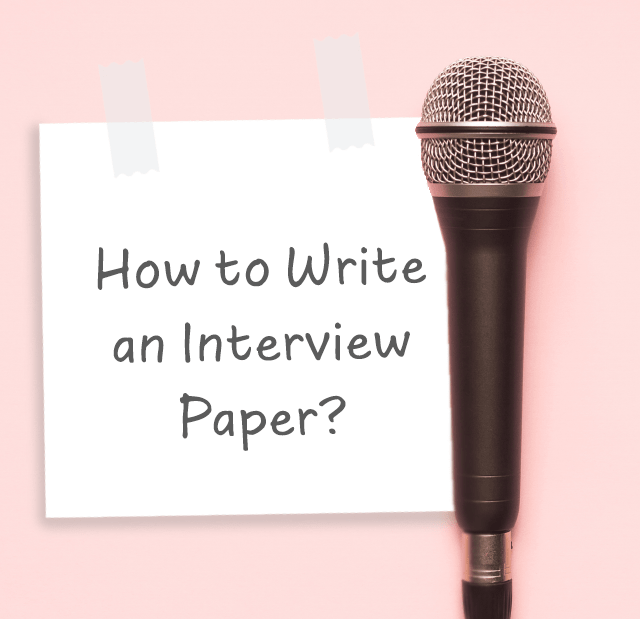

What is an Interview Paper?
An interview paper provides an expert opinion on a specific issue. In essence, it is an interview transcript inserted somewhere between the introduction and conclusion of an academic piece.
How long should it be? It depends on the topic and the length of your interview, but most papers are within the length of 2,000 – 5,000 words. What things should you consider before writing an interview paper in the first place? Let’s check them out below.
General Aspects of Writing an Interview Paper
Academic papers require you to provide arguments based on studies, research pieces, statistics, etc. But an interview paper is different – for this type of essay, you will develop assumptions around an expert’s opinion.
Let’s imagine your essay question reads the following: “Should we ban abortions?” If you write an interview paper, you should ask someone high-powered for their consideration. Let them be an executive director of the American Gynecological & Obstetrical Society.
You would reach them via email or phone or whatever communication channel you prefer and conduct an interview. Afterward, you would put all your findings on paper.
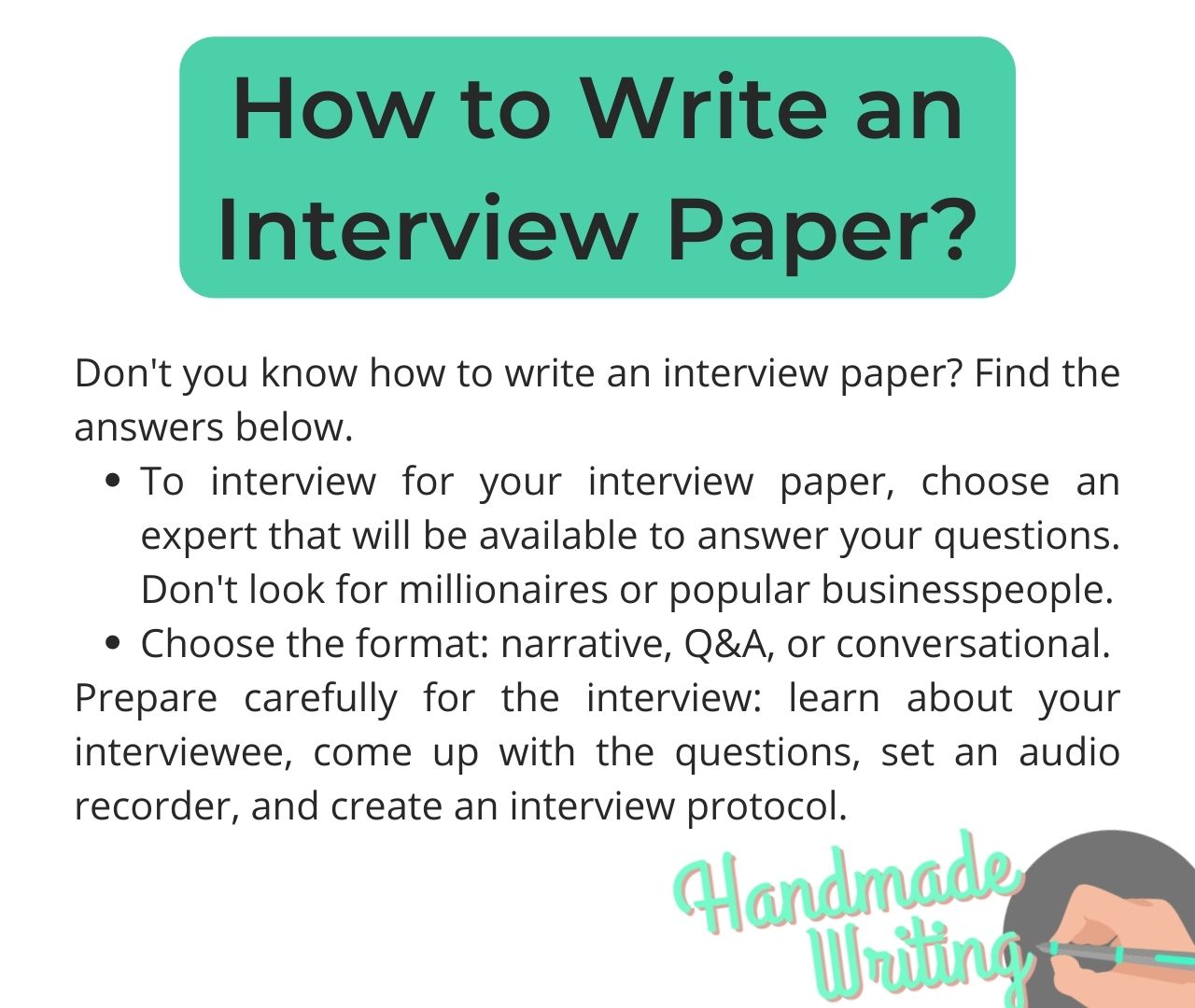
But in practice, writing an interview paper involves many more complexities and challenges, like planning, topic research , drafting, etc.
Let’s speak straight facts: nobody will reschedule their week to meet you because you need to do some homework. You’re one of the millions of students, and the local governor or a famous scientist won’t give you an interview nine times out of ten.
So you would want to target someone less busy, like professors from other faculties of your college or some researchers within your academic environment. Hunting a bigger fish is pointless unless you’re a well-established journalist working for a popular media channel. If you struggle to find someone within your college/university, you can contact people from your circle.
Writing Outline and Structure of an Interview Paper
As you know, a typical paper consists of three parts:
- Introduction. This part includes background information, the hook, the thesis statement, and the transition.
- Body. It is the longest part of the paper consisting of several paragraphs. It should contain the actual interview.
- Conclusion. The final part summarizes the considerations and insights of your essay.
The question is: ‘where should you put an interview transcript and how do you do this?’
To answer this question, you need to come up with the interview papers format in the first place. There are several of them:
The narrative format implies that you can use either direct or indirect speech when referring to your interviewee. If you choose this path, you can stick to a 5-paragraph essay structure, retell the considerations of your interviewee, and cite their words here and there at your discretion.
You can also choose this format if you contact several people. Check what a narrative interview paper structure looks like when you reach out to several people:
- Introduction.
- Paragraph #1 – the first interviewee’s perspective.
- Paragraph #2 – the second interviewee’s opinion.
- Paragraph #3 – the third interviewee’s thoughts.
- Conclusion.
Alternatively, you can dedicate each paragraph to a particular idea of one person.
“Question and answer” will suit your needs perfectly if you interview one person. It is the simplest format used in online magazines, news reports, and other media. Your interview paper outline will look like this:
- Introduction
- Question #1 – Answer #1
- Question #2 – Answer #2
- Question #3 – Answer #3
- Question #4/5/6/etc. – Answer #4/5/6/etc.
- Interview analysis. You may include your thoughts on the subject matter.
Conversational
Conversational style is informal, and you can use either first-person or second-person narrative and follow a typical 5-paragraph paper structure. But writing interview papers in this lousy style might be perplexing, especially if you deal with this task for the first time.
We advise you to try the Q&A format because it’s the simplest one and takes the least time. Just imagine how much time your paper writing will take if you decide to interview three or five people.
How to Start an Interview Paper?
If you have no idea how to start an interview paper, choose the topic first. Selecting a topic for your interview paper is not a big deal, but you should keep in mind that you may not find appropriate interviewees for it.
Let’s imagine you want to explore whether the government should force people to get vaccines. This topic implies that you need to contact authorities. It might be a local lawyer, governor, or executive director of a local hospital. Well, the chances are these people will politely refuse to give an interview for your homework.
But if you choose to investigate how lockdown impacts intellectual workers, you can contact your friends or family members who work at home. In other words, it’s better to choose topics that reflect the experiences of ordinary people rather than the opinions of untouchable experts.
Asking people for their opinion about well-known facts like the Earth’s shape is a bad idea. You would want to choose high-profile debatable topics you can actually discuss.
Establish the Goal of Your Interview Essay
You have to establish the goal of your essay before researching the topic. For this, ask yourself: “What message should your interview essay deliver?” Sometimes, a topic of your choice might already explain the purpose of your essay.
Conduct Research
Interviewing someone implies that you should ask questions. But you will fail to do so if you know little to nothing about your topic. So read some case studies, news, articles, etc. Once you get the picture of your subject matter, you will come up with dozens of interview questions.
Get to Know Your Interviewee
A good interviewer always refers to the life and experience of their interviewee. If you’re lucky to work with someone you can read about on the Internet, find out as much information about them as possible. If your interviewee publishes any books, articles, or studies, you will better know them as well.
The more you know about the person, the more interview questions you can come up with. You can ask them whether the Internet tells their true story: “Is it true that you, Mr. Interviewee, support flat earthers?”
Draft Your Interview Questions
If you want a person to share their in-depth vision of the topic, you need to ask both open-ended and close-ended (“yes/no”) questions. However, you may struggle to prepare interview questions. Many students get stuck during this stage. To overcome this block, you need to learn some types of interview questions:
- Opinion – What do you think of this topic?
- Behavioral – What would you do in this situation?
- Experience and knowledge – What do you know about the subject?
- Background – How are you connected to the subject? What is your age, occupation, etc?
- Emotional – How do you feel about the subject?
- Sensory – What does the subject taste and feel like?
You can also think of the questions following the interviewee’s “yes” and “no” answers.
Tips for Conducting a Successful Interview
These four tips will help you conduct a productive interview on the first try:
1. Plan Your Meeting
Note that you want to interview a person in a quiet place so that nobody will distract you. This might be some cozy book store or a café. Or, you can arrange an online meeting. Make sure you have at least one hour for the interview.
2. Rehearse a bit
If you will conduct your first-ever interview, you want to practice with your friends/significant other/ family in the first place. This approach will help you identify what stage of your upcoming interview may challenge you the most.
3. Record Your Interview
You will forget about 50% of the information within an hour once you finish the interview. So don’t rely on your memory − bring a recorder instead. Why not take notes? You wouldn’t want to go red while asking your interviewee to repeat what they have just said or wait until you write down their answers.
4. Talk to Your Interviewee for a While Before You Begin
Speaking to someone you don’t know might be uncomfortable. You don’t have to attack them with your interview questions straightaway. Instead, you can exchange some casual phrases or discuss the weather. This will help you relieve stress and get comfortable with each other.
5. Explain Your Interview Protocol
It’s better to explain to your interviewee how you will conduct your interview. Tell them that you will use a recorder and introduce the discussion topic.
Interview Papers Format

In academic writing, you have to explain the purpose of your interview and introduce your interviewee in a specific “scholarly” format. The APA format interview paper has the following requirements:
- Use 12-point Times New Roman.
- Write a title page.
- Use double spacing.
- Introduce your interviewee and provide the background information – explain why this person is suitable for the interview. Mention their name and qualifications.
- Use direct quotes if you cite some facts provided by the interviewee.
- Use block quotes for citations longer than 40 words.
How to Write a Title Page?
The title of your paper must include your name, your institution, department, the course name and number, the teacher’s name, and the assignment date. The rules of writing the title page are the following:
- The title page must be numbered.
- Capitalize all major words in your title and make it bold.
- Place the title of the essay three or four lines down the top of the page.
- There must be one empty line before the student’s name.
Interview Papers Examples
If you’re searching for an interview essay example – check several samples below:
- A narrative interview essay .
- A Q&A interview format paper.
- An interview with a scientist.
Interview Papers Writing Tips
The following writing tips will help you deliver the first-class interview paper:
- Write the introduction at the end. Once you finish your essay, you will likely reconsider some ideas you had before you began. They will help you frame your interview essay with a captivating introduction and conclusion.
- Give yourself a break after finishing your final draft. This will help you look at your paper with a fresh pair of eyes once you start editing.
- Edit one type of error at a time. For example, you can reduce logical errors first and switch to grammatical mistakes afterward.
- Use an active voice. If active voice makes your sentence shorter, use it without hesitation.
- Check for any sample interview paper to decide on the interview questions. Perhaps, some pieces will spark your interest.
Writing Help by Handmadewriting
An interview paper doesn’t seem that intimidating once you learn how to write it step by step. First, you have to choose the subject that allows you to interview ordinary people rather than hard-to-reach ones. Then, you need to research your topic, conduct an interview, and write a paper.
You can get an A+ for this assignment with enough effort and dedication. But a doable task doesn’t necessarily mean that you must do it by yourself. If you have plenty of other assignments to do, you can ask our essay writers to craft an exemplary interview paper for you. For this, you can place an order on our website, and we will do all the dirty work.

A life lesson in Romeo and Juliet taught by death
Due to human nature, we draw conclusions only when life gives us a lesson since the experience of others is not so effective and powerful. Therefore, when analyzing and sorting out common problems we face, we may trace a parallel with well-known book characters or real historical figures. Moreover, we often compare our situations with […]

Ethical Research Paper Topics
Writing a research paper on ethics is not an easy task, especially if you do not possess excellent writing skills and do not like to contemplate controversial questions. But an ethics course is obligatory in all higher education institutions, and students have to look for a way out and be creative. When you find an […]

Art Research Paper Topics
Students obtaining degrees in fine art and art & design programs most commonly need to write a paper on art topics. However, this subject is becoming more popular in educational institutions for expanding students’ horizons. Thus, both groups of receivers of education: those who are into arts and those who only get acquainted with art […]
How to Write an Interview Essay: Complete Guide
College and high school teachers often assign interview papers to test their learners’ planning, paraphrasing, and critical thinking skills. So, besides drafting a well-substantiated and information-packed piece, students must also organize and conduct an interviewing process.
Hence, this assignment is far from straightforward. Quite the contrary, it requires substantial pre-work before the actual meeting. Moreover, the task further complicates if you include several subjects or elaborate on a compelling theme.
What if you can’t meet an ideal candidate to elaborate on your topic? How to pose questions that reveal valuable information and present your findings on paper? How to write an interview essay introduction with attention-grabbing ideas that bring up current dilemmas or resolve an issue? There are so many trilemmas spinning around your head.
Fortunately, there’s no need to feel intimated or discouraged. This article will help you grasp the basics of an interview paper and how to write an outstanding piece. It will also discuss the steps involved in the writing process and give a few helpful tips that ensure your final product passes with flying colors.
What Is an Interview Essay?
An interview paper is an academic written piece that presents the insight the interviewer gained while interviewing one or several people. It aims to expose different perspectives on a particular topic once the writer gathers relevant data through research. Typically, the essence of the paper will rest upon your findings from the interviews.
The presented viewpoints will depend on the respondent. So, for example, if your paper interview focuses on social media, you might consider talking to an influencer. Conversely, if you’re elaborating on a burning social issue, you may want to speak to a local authority. Or set up a meeting with a scientist if you’re exploring natural sciences.
The interview paper must help the reader understand a concept backed by relevant statements. Unlike definition essay writing , where you paraphrase and cite trusted sources like scholarly books, the interview paper will stem from authoritative individuals in the respective field.
Finally, you can reap a lot of benefits from drafting interview essays. More specifically, those interested in becoming broadcast journalists, newspaper reporters, or editors will learn to pose thought-provoking questions. Similarly, HR managers will polish their screening ability and hire excellent candidates. Even prospective detectives and inspectors can gain from writing an interview essay. They will formulate a variety of engaging questions to get honest and accurate answers.
Outline and Typical Structure of an Interview Paper
Most essays follow the template of a basic 5-paragraph paper. Yet, the length can vary according to your subject and data availability. A standard interview essay from a custom writing service can range from 2,000 to 5,000 words or up to ten pages. Individual works are usually shorter.
The interview essay format will have an introduction, body segments (perspectives grouped under different subheadings), and a summary. Here’s an overview of what to put in each part.
Introduction . The writer needs to create an atmosphere of uncertainty and urgency to stimulate the audience to keep reading. It should also provide background information about the theme and the interviewee. Furthermore, the initial part can list statistics or what society thinks about the respective topic. Finally, your intro must contain a thesis that transitions into the main section.
Body . This part will present the pillars on which you conceptualized your research. If you get stuck while drafting the body, you might hire an online service to write an essay for you and incorporate the gathered data. They will isolate the main points and help you frame the perfect timeline of events.
Moreover, the body should reflect important facts, life periods, and considerations of your interviewees. For instance, you might split your paper into infancy, adolescence, university, marriage, and golden years. Or you might divide your segments according to different discussion questions.
Conclusion . Use the ending part to summarize the interviewee’s thoughts and your insights into the matter. You might also compare the available data to the facts collected during the meeting and verify their validity. The bottom line must leave a lasting impression on your audience.
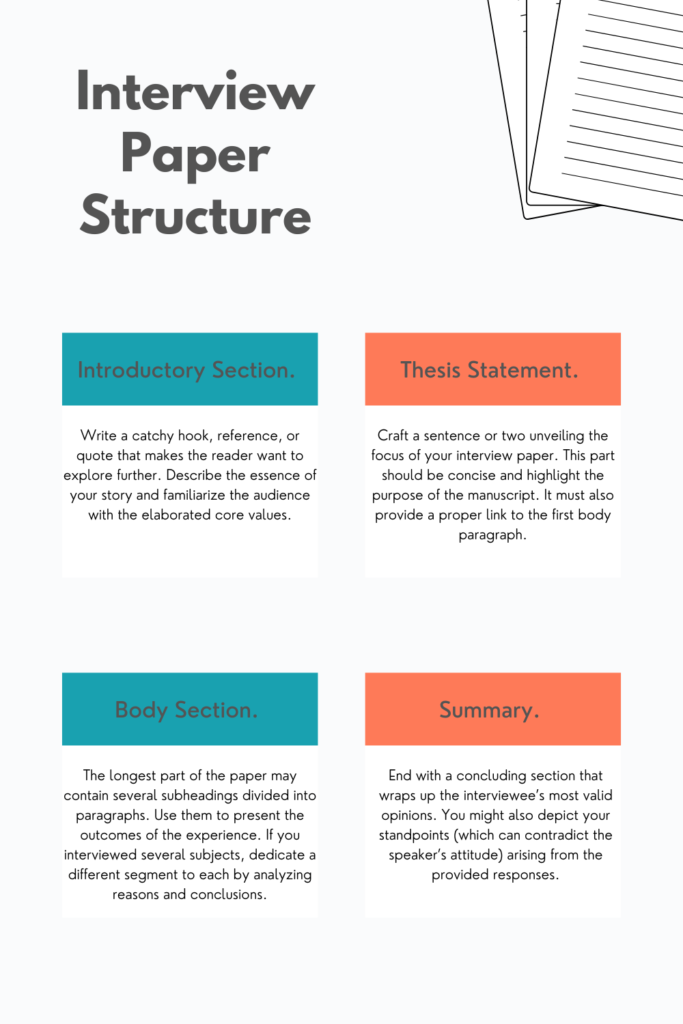
Steps for Writing a Successful Interview
Below is a detailed description of the paper composition journey. Consider each step carefully and be consistent in your approach.
Define the Paper’s Objective
Writing an interview paper urges you to establish the overall purpose. You will have to specify the message you plan to deliver. For example, if you want to verify a public opinion, you’ll have to question several subjects. Alternatively, proving a natural phenomenon will require a conversation with an expert in the field.
Explore the Subject
Find and prepare printed and virtual materials related to your research. Previous interviews and works by the interviewee are also vital. Unlike rebuttal essays , your primary goal is to gather details supporting your claims. Therefore, brainstorm any note you found based on your predefined criteria.
Pick an Interview Format
Your sample form will depend on the specific theme. Most students decide to buy a literature essay online due to their lack of formatting skills. Here are the various formats you can choose when presenting your findings.
This format implies using direct or indirect speech to analyze the storyline. Consider retelling the considerations of the interviewee and citing the original wording. The narrative format is also advisable if you talk to a few interviewees. The structure should contain an intro, a body (each paragraph can describe a particular idea of a single person), and a summary.
Question-and-answer essays are ideal when interviewing one person. Most magazines and news reports prefer this type because it is the simplest. Your interview paper will have an intro, different parts for each question and answer, an analysis with your perspective, and a summary.
Informative
Also known as conversational or personal, these papers are informal and take first or second-person narration flow. However, writing in a dialogue form might be confusing and perplexing for an untrained eye.
Formulate the Questions
Make a thorough list of all the aspects you want to discuss and cover in the interview paper. Ask close-ended (yes/no) and open-ended questions that require in-depth responses. If you struggle with your questionnaire, consider the following suggestions:
- Share your core values
- What would you change in the world if you had a superpower for a day?
- How did your childhood impact your personality?
- What is the recipe for success?
- What is the best aspect of your job?
- How do you overcome your deepest fears?
- Define happiness with examples
- What object do you hold most dear and why?
- What is the most significant challenge in our society?
- How do you imagine the world’s future?
Get in Touch with the Respondent
Make an effort to contact your interviewee/s and be professional when arranging the meeting. You might need to use several communication channels to reach your target person. Focus on scheduling a time that works for everyone involved in the project.
Facilitate the Interview
Choose a peaceful and quiet place without any distractions. Always arrive on time for the meeting. Alternatively, consider setting it up in an online format, if finding a physical location isn’t viable. Most importantly, allow the speakers enough time to share their thoughts and maintain an impartial attitude to avoid miscommunication.
Interview Essay Writing Tips
Here’s some additional advice for writers taking the first steps toward interview writing.
Stick to Your Teacher’s Instructions
Your professor will probably mention the paper structure. For instance, if you receive a classification essay writing guidelines , don’t experiment with other formats. Moreover, rehearse the face-to-face meeting with a family member to avoid possible deadens. Here, you might come up with a follow-up question that clarifies some vague points.
Quote and Paraphrase Your Sources
Organize all the details on the background, education, and achievements before interviewing itself. When referring to the topics discussed, cite them properly and give credit. Also, explain the protocol to the respondent and the purpose of the research.
Consider Recording the Interview
The longer the meeting, the more details you’ll forget once you finish it. Avoid over-relying on your memory, and bring a recorder. Taking notes is also essential. However, don’t record unless the respondent gives prior approval.
Mind These Formatting Rules
Use a font size of 12 in Times New Roman with double spacing. Don’t forget to write a title page, too. When including citations longer than 40 words, use block quotes.
Edit and Proofread
Don’t expect the first draft to be the best. Reduce grammar mistakes and typos by polishing your initial wording. The final version must be logical, easy to read, and plagiarism-free.
Bottom Line
As intimidating as the interview paper might seem at the onset, these guidelines will help you stay focused and organized. Above all, pick an important topic with questions that affect ordinary people. This way, you can set up and develop the interviews more quickly. Undoubtedly, an A+ grade takes dedication and perseverance to research and write your paper.
Related posts:
- How To Write A Good Compare And Contrast Essay: Topics, Examples And Step-by-step Guide
How to Write a Scholarship Essay
- How to Write the Methods Section for a Research Paper: Effective Writing Guide
- Explaining Appeal to Ignorance Fallacy with Demonstrative Examples
Improve your writing with our guides

Definition Essay: The Complete Guide with Essay Topics and Examples

Critical Essay: The Complete Guide. Essay Topics, Examples and Outlines
Get 15% off your first order with edusson.
Connect with a professional writer within minutes by placing your first order. No matter the subject, difficulty, academic level or document type, our writers have the skills to complete it.
100% privacy. No spam ever.

How To Write an Interview Essay
The aim of an interview is that through using people rather than books or articles, the writer can obtain a first-person viewpoint on a subject. The interview can be related to experiences in their life or may be related to a field in which they are an expert. Clearly these types of essays require a different form of planning and research. Typically, this includes the following steps:
- Determine the subject on which the person is to be interviewed.
- Identify the target interviewees, contact them, and ask for consent.
- Personal details (name, occupation, or credentials where appropriate, age if relevant, location if relevant)
- Primary question: The main focus of the work and some short main topic questions
- Notes on exploring the respondent’s answers – i.e., reminder questions for the writer such as “why do you feel that way?”, “Can you explain that in more detail?”, “Why do you think some people disagree with you?”
- Analyse the information / answers given by your interviewee.
Once you have followed these stages, you can draft / outline your interview essay in a more standard format:
- Break up the responses into key themes or points that you will make.
- Identify any other sources that you will use in your essay.
- Give an approximate word count to each section.
Note that using closed questions requiring “yes/no” answers are effective for gathering factual information, however, more detailed responses can be achieved with open-ended questions starting, “how”, “why”, “talk to me about…” and similar. Using these questions also encourages you to ask more for more detail that will expand your essay and source information.
Analysing your interviews
When analysing your interview(s), the approach will depend on the focus of your interview. For example, if you have undertaken 2/3 interviews for considering an experience, you may wish to follow the narrative route. However, if you have undertaken only one interview on a specific topic in which your interviewee is an expert, you may look at content analysis. In both cases, however you should, as you look through the interview notes or transcriptions if you have these and ask yourself:
- What reasons/ points/ perspectives did the interviewees give in support or opposition to the main topic
- Are they positive or negative?
- How does their responses compare to existing views?
- How interesting or important are the responses given?
- What is your own perspective of the views/reasons/responses given?
Once you have written down your initial analysis in order to structure your interview essay in a logical format you should then list the points/reasons given in the following way:
- least to most important
- positive first, then negative
- negative, then positive
- those you disagree with, those you agree with
- those which are pretty typical, those which are unusual.
Writing your Interview Essay
Introduction.
Your introduction should commence with an indication of the key question asked. This can either be in the form of a comment from the interviewee or a description of the situation that led to the development of your main question.
In addition, you should clearly state the type of interview undertaken (survey, narrative etc.) so that the reader has a context for your work. The introduction should then provide an overview of the responses given, along with your own perspectives and thoughts on these (your thesis statement) before introducing the body of the essay through linking. For example, “having stated X, the work will now provide a more detailed overview of some of the key comments and their implications in relation to XX”.
The body text should follow the order of your points indicated above. Use only one paragraph per point structured by indicating the point made, why you agree/disagree and any other relevant subpoints made by the interviewee in regard to the first points.
The paragraph should conclude with a link to the next theme which leads to the next paragraph and demonstrates cohesion of thought and logical flow of reporting the interview analysis. Note: you can include quotations from the interview, but do not rely on these, they should only be used to reinforce a point of view, and where possible avoid the inclusion of slang or swearing unless it is vital to the point you are making.
Your conclusion should bring together all the perspectives given by the interviewee. It is, in effect, a synopsis of the work with your own conclusions included. It is useful to refer back to the main question and your thesis statement to indicate how the interviewee answered (or not) your question and what this means for your future views or action in regard to the topic. A strong conclusion is as vital as a strong introduction and should not introduce any new information but should be a precis of the overall essay.
Key Phrases for an Interview Essay
The main subject under discussion was…”
“The interviewee was very clear when discussing…”
“The interviewee was somewhat vague when asked about…”
“This raised the question of…”
“When asked about x, the interviewee stated/asserted/claimed/maintained/declared, believed/thought/.”
“From the perspectives given by the interviewee it seems that…”
You may also like


Interview Essay
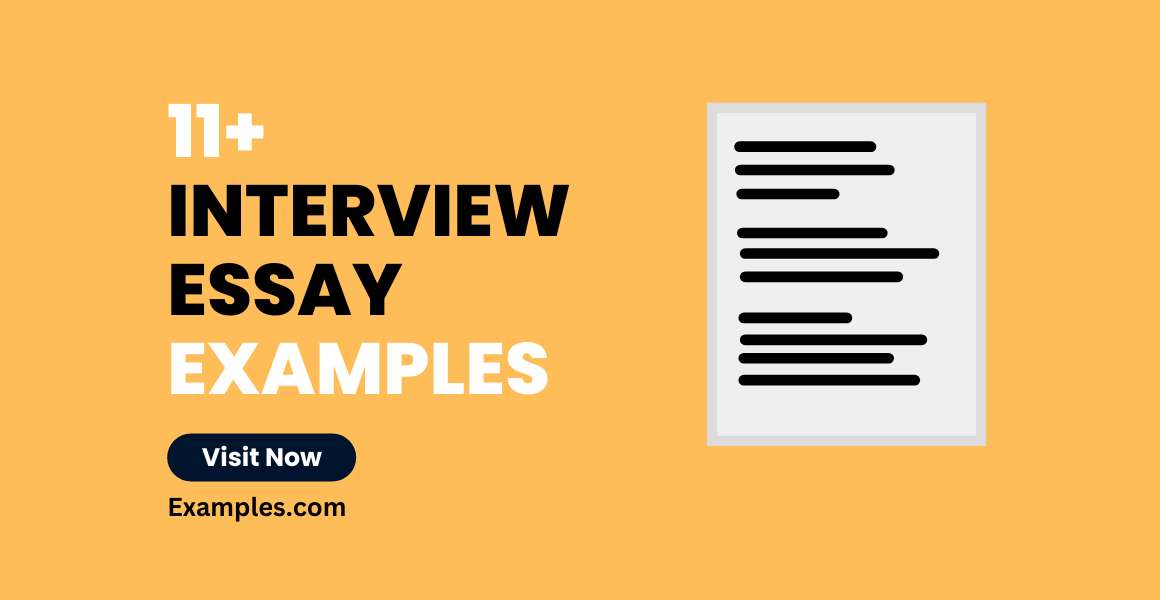
Essay writing is different for everyone. Some people choose to go to the library and search for facts on a given subject, while others like to focus on gathering information through personal statements .
During this interview process, interviewers typically ask a series of interview questionnaire that their readers may want to know about. These details are either recorded or jotted down by the interviewee. With what has been gathered, an individual may then write a complete essay regarding the exchange.
Interview Essay Sample
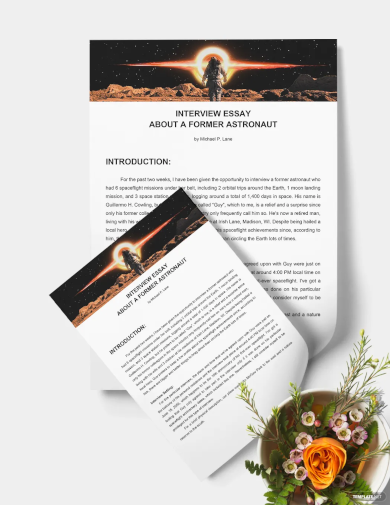
- Google Docs
Size: 168 KB
Personal Interview Essay Template
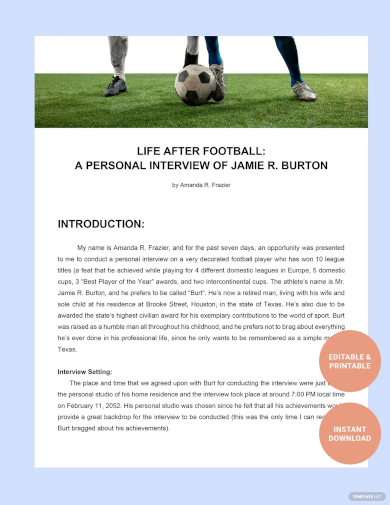
Size: 136 KB
Nursing Interview Essay Template
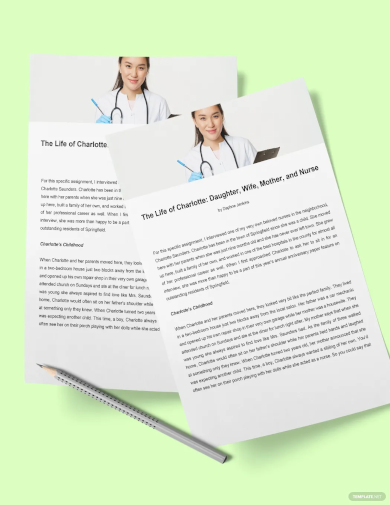
Size: 123 KB
Leadership Interview Essay Template
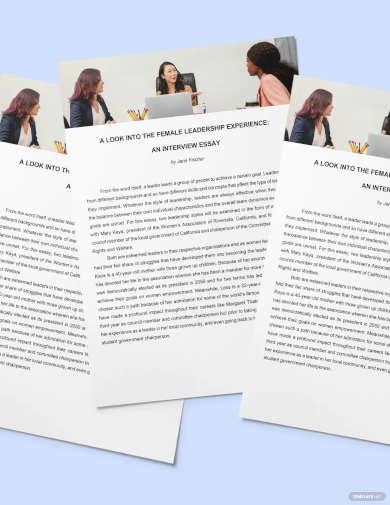
Size: 154 KB
Teacher Interview Essay Template
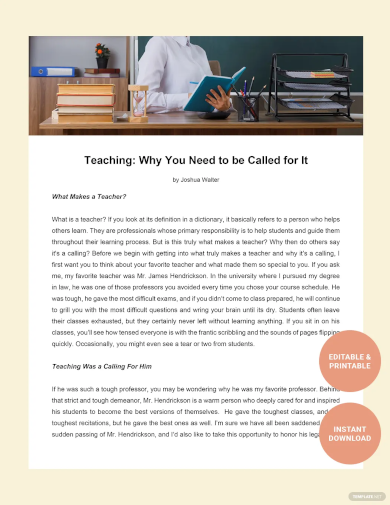
Size: 150 KB
Job Interview Essay Sample
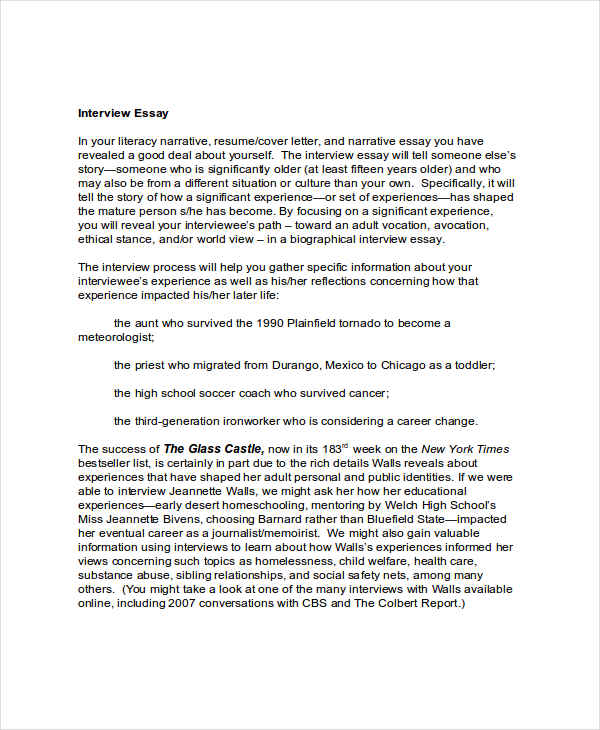
Narrative Interview
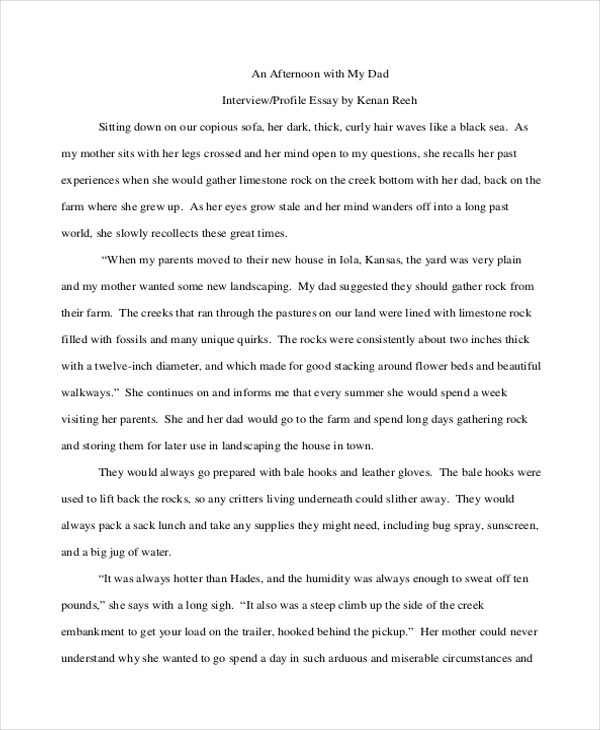
Size: 70 KB
Career Interview Essay
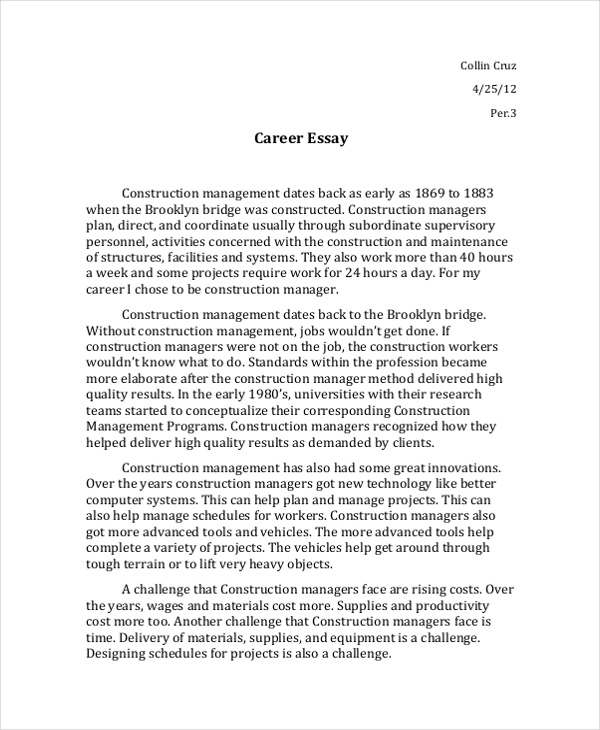
Size: 29 KB
What Is an Interview Essay?
Interview essays are typically based on research gathered from personal testimonies. This could be based on one’s personal experiences or their own input on a given matter. It may be informative essay , descriptive essay , or even persuasive essays , depending on the questions asked by the interviewer.
The content of the essay may include direct quotes from the interview or it may come in a written narrative form. Through this, we are able to gain additional information from a particular perspective.
What to Include in an Interview Essay
For every essay, a thesis statement is needed to help your readers understand the subject being tackled in your work. For an interview short essay , you would need to talk about your interviewee. Any information that will create a credible image for your interviewee will be necessary.
Next, it’s necessary to include the significant ideas that you have acquired from your interview. Ideally, you should pick three of these ideas, elaborate what has been said, and present it in paragraphs. Be sure to emphasize these points in a detailed and concise manner, a lengthy explanation might be too redundant. You may also see sample essay outlines .
Leadership Essay
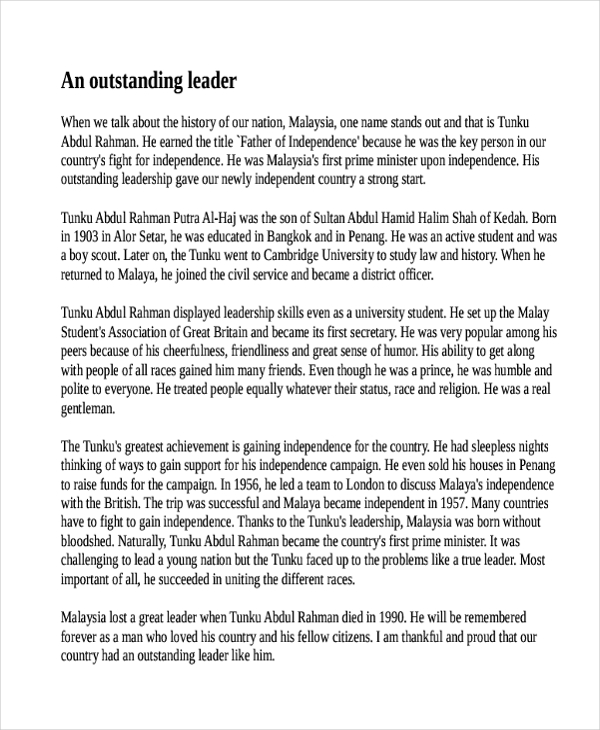
Size: 24 KB
Nursing Interview Example
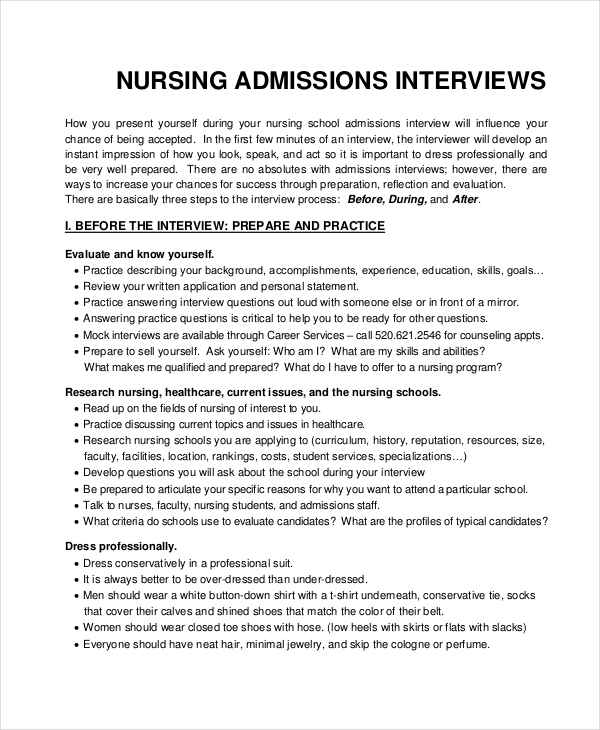
Size: 146 KB
Personal Interview
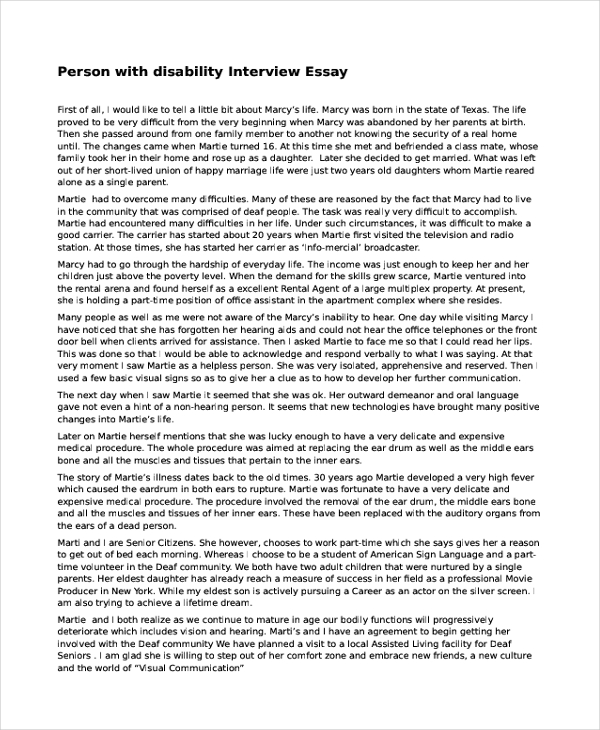
Size: 18 KB
Parent Interview Sample
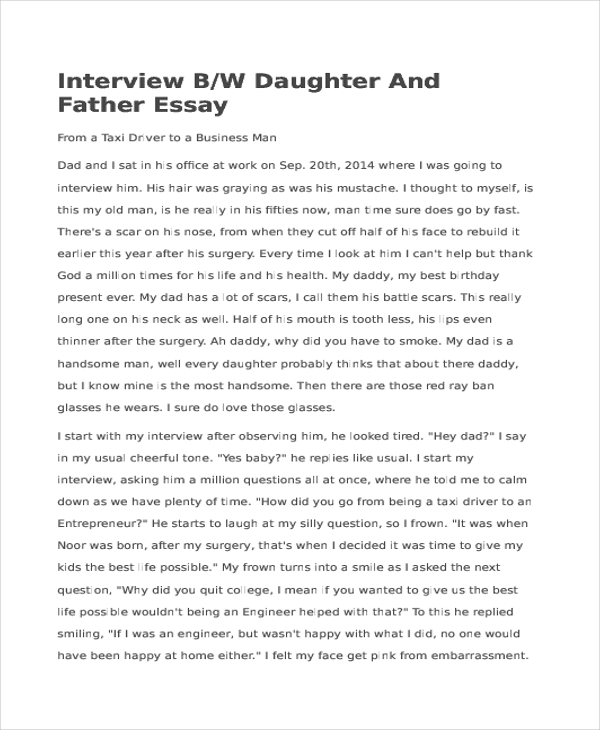
Size: 15 KB
Guidelines for an Interview Essay
When writing an interview essay, it would be best to create an outline first.
Organize the information you have gathered from your interviewee and structure it in a logical order. This could be from one’s personal information to the most compelling details gathered. Be reminded of the standard parts of an essay and be sure to apply it to your own work.
Even when most, if not all, of your essay’s content is based on what you have gathered from your interviewee, you would still need to create a good starting of essay and end to your essay.
Additionally, do not forget to put quotation marks around the exact words used by your interviewee. It would also be best to proofread your work and make sure that there is a smooth transition for each thought. You may also like personal essay examples & samples.
How to Conclude an Interview Essay?
You can end your interview essay how ever you wish to do so. It could be about your learning from the interview, a call to action, or a brief summary writing from what has been expressed in the essay.
But keep in mind, this would depend on your purpose for writing the essay. For instance, if you interviewed a biologist to spread awareness about mother nature, then it would be best to conclude your essay with a call to action. Knowing this, it’s important to end your essay well enough for it to be memorable.
Interview Essay Generator
Text prompt
- Instructive
- Professional
Write an Interview Essay on a local community leader.
Discuss the career journey of a teacher in your Interview Essay.
- PRO Courses Guides New Tech Help Pro Expert Videos About wikiHow Pro Upgrade Sign In
- EDIT Edit this Article
- EXPLORE Tech Help Pro About Us Random Article Quizzes Request a New Article Community Dashboard This Or That Game Popular Categories Arts and Entertainment Artwork Books Movies Computers and Electronics Computers Phone Skills Technology Hacks Health Men's Health Mental Health Women's Health Relationships Dating Love Relationship Issues Hobbies and Crafts Crafts Drawing Games Education & Communication Communication Skills Personal Development Studying Personal Care and Style Fashion Hair Care Personal Hygiene Youth Personal Care School Stuff Dating All Categories Arts and Entertainment Finance and Business Home and Garden Relationship Quizzes Cars & Other Vehicles Food and Entertaining Personal Care and Style Sports and Fitness Computers and Electronics Health Pets and Animals Travel Education & Communication Hobbies and Crafts Philosophy and Religion Work World Family Life Holidays and Traditions Relationships Youth
- Browse Articles
- Learn Something New
- Quizzes Hot
- This Or That Game New
- Train Your Brain
- Explore More
- Support wikiHow
- About wikiHow
- Log in / Sign up
- Education and Communications
- Communication Skills
- Interview Skills
How to Summarize an Interview
Last Updated: March 20, 2024 Fact Checked
This article was co-authored by Richard Perkins and by wikiHow staff writer, Krysten Jackson . Richard Perkins is a Writing Coach, Academic English Coordinator, and the Founder of PLC Learning Center. With over 24 years of education experience, he gives teachers tools to teach writing to students and works with elementary to university level students to become proficient, confident writers. Richard is a fellow at the National Writing Project. As a teacher leader and consultant at California State University Long Beach's Global Education Project, Mr. Perkins creates and presents teacher workshops that integrate the U.N.'s 17 Sustainable Development Goals in the K-12 curriculum. He holds a BA in Communications and TV from The University of Southern California and an MEd from California State University Dominguez Hills. There are 7 references cited in this article, which can be found at the bottom of the page. This article has been fact-checked, ensuring the accuracy of any cited facts and confirming the authority of its sources. This article has been viewed 28,739 times.
After conducting an interview, you may find that you need to share the information in a quick and easy way. In comes the interview summary, a written statement that briefly covers the major points you discussed with your interviewee. Interview summaries are handy for oral histories, job interviews, informational interviews, and much more, but how do you create one? We’ve created this comprehensive guide to help you summarize an interview. Scroll down to get started!
Things You Should Know
- Take another look at your interview notes and recordings as a refresher. Writing down a list of major points can help you plan your summary.
- Pick a format that will let you summarize information most efficiently. Longer interviews will likely need a longer summary than shorter ones.
- Only include important details that connect to the major theme of the interview. Summaries don’t need a lot of elaboration.
Review the interview.

- Pay special attention to any repeated themes or ideas your interviewee brought up. If there’s something they really wanted to get across, that should be highlighted in your summary.
- If you’ve interviewed more than one person at once, make sure you have each answer attributed to the correct person.
Make a list of key points.

- Make notes of how they behaved, their temperament, their background, and any other points relevant to who they are.
- Think about what they actually said, rather than your interpretation. How do the answers connect to the topic of the interview?
- Look at the manner your interviewee answered your questions. Were they direct and to the point? Friendly and open? Did they evade anything?
Pick the format of your summary.

- For longer interviews, a multi-paragraph summary is a good choice. You can break down certain sections of the interview in each paragraph and ensure no major points are missed.
- The length restriction of a paragraph-long summary will make you focus on the highlights only. If you are preparing the summary or multiple summaries to help streamline a hiring process, for example, choose this option.
- The question and answer (Q&A) format is also an option. This style opens and ends with a narrative description but reproduces the entire or parts of the interview transcript in the middle. Many interview articles found in magazines take this format.
Adjust your tone to your audience.

- ”The interviewee seemed cool,” is informal. On the other hand, “The interviewee appeared relaxed,” makes a similar claim but uses more formal language.
- Be aware of connotations in the words you choose. Although words like “picky” and “selective” have similar meanings, the former has a more negative connotation than the latter. Choose more neutral phrasing when writing your summary.
Describe the interviewee in the introduction.

- ”Jane Doe is interviewing for the position of Project Manager. She possesses a bachelor’s degree in business administration and 3 years experience as an Assistant Project Manager.”
- Appearance-related details are most likely not necessary except in certain circumstances. For example, in a celebrity interview summary, your audience may want to know what they were wearing.
Order the remaining information by relevance.

- If you find your points are equally important, use a chronological format to organize your summary.
Focus on main points rather than small details.

- The main points should connect to the topic of your interview. Consider how your interviewee’s answers reflect the position you’re looking to fill, the thesis of your oral history, the movie they’re promoting, etc.
- In a paragraph-long summary , sum up the point in a sentence. For example if you asked about teamwork, you can summarize their point as “The interviewee showed teamwork skills during X project,” without further elaboration.
- Alternatively, in a multi-paragraph summary, you have more room to summarize both an anecdote and the main point. Your statement about teamwork could be, “The interviewee collaborated with others to create a better product. This shows their willingness to work on a team.”
Make objective statements.

- A statement like, “I found that Jane exhibited strong leadership skills,” is subjective because it expresses a personal opinion. Fix this by stating how Jane exhibited strong leadership skills. Consider: “Jane has taken leadership roles on multiple projects.”
- ”John always shows a lot of care for his community,” is a subjective statement because “always” can be vague and an exaggeration. Instead, opt for “John shows his care for his community by volunteering and planning events.” This statement is more clear and can be backed up with facts.
Paraphrase the interviewee’s answers.

- Take the following statement: “I have always wanted to help animals since I was a kid. That’s why I volunteer at my local animal shelter and foster kittens when I can.” This can be paraphrased as “The interviewee has a vested interest in animal care.”
- ”In 5 years, I see myself taking on more responsibilities and leading a team,” can be paraphrased as “The interviewee plans to take more leadership roles in the future.”
- To keep your summary as short as possible, you may not need to paraphrase either. If what your interviewee said can be wrapped into a certain skill or characteristic, write that instead.
Write the conclusion.

- If relevant, mention any impressions you’ve had. Did you find the interviewee well-prepared? Are there any concerns on your end?
- For a job recommendation, you may finish with, “Jane was well-spoken, prepared, and displayed high interest in the position. I recommend her for a second interview.”
- Likewise, for an oral history project, you might write “Mr. Jones was clearly proud of his city despite its flaws.”
Proofread and revise after you finish.

- Automated spelling and grammar checkers can still make mistakes. Reread the summary yourself for the most thorough revision.
Expert Q&A
You might also like.

- ↑ https://writingcenter.unc.edu/tips-and-tools/oral-history/
- ↑ https://writing.ku.edu/prewriting-strategies
- ↑ https://libguides.randolph.edu/summaries
- ↑ https://scholarlyoa.com/right-tone-for-writing/
- ↑ https://www.esc.edu/online-writing-support/resources/academic-writing/process/shaping-information/ordering-information/
- ↑ https://writingcenter.uagc.edu/writing-summary
- ↑ https://public.wsu.edu/~mejia/Summary.htm
About This Article

- Send fan mail to authors
Did this article help you?

Featured Articles

Trending Articles

Watch Articles

- Terms of Use
- Privacy Policy
- Do Not Sell or Share My Info
- Not Selling Info
Get all the best how-tos!
Sign up for wikiHow's weekly email newsletter
How to Write an Interview Essay Introduction
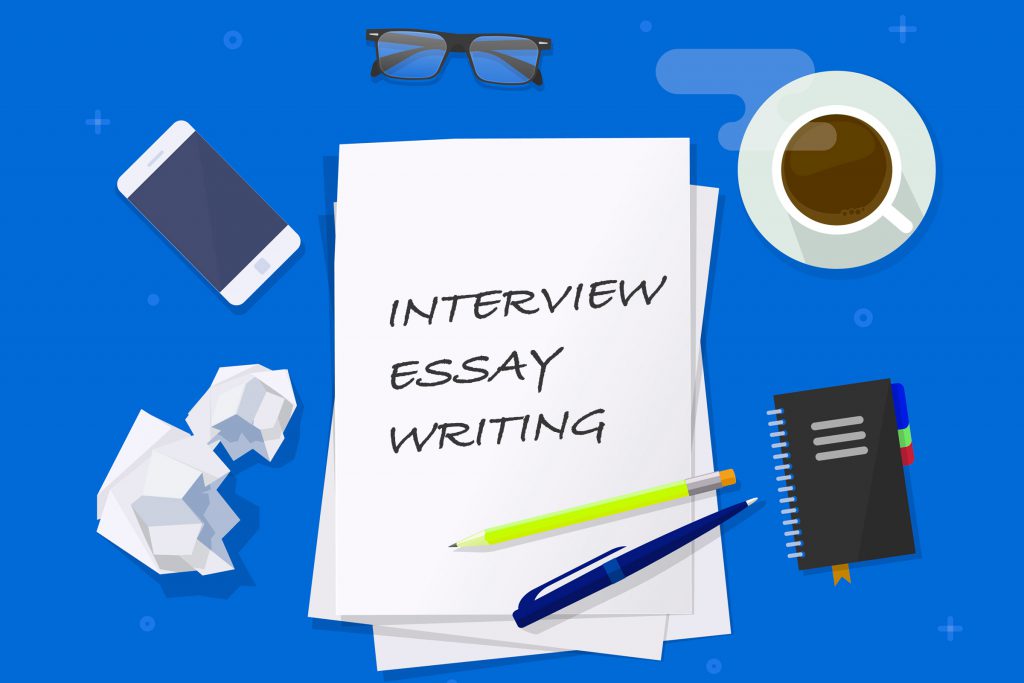
If you’re looking for freelance essay writers for hire , you’ll want to know what a good interview essay introduction looks like so you can judge the quality of their work. An essay introduction can be tricky to get right, but if it’s written well, it can really pull the reader in and help set the tone for the rest of the essay.
But before we dive into how to do it right, let’s briefly touch upon what an interview essay really is.
What Is an Interview Essay?
At its core, an interview essay is an essay that explores different perspectives of people on a given topic. Unlike other types of essays, such as argumentative or persuasive essays, an interview essay doesn’t try to win over the reader to one particular point of view. Instead, it allows the reader to better understand the views of those who are interviewed by providing first-hand accounts of their experiences.
When contemplating what makes an essay good , writing an effective essay introduction is of the utmost importance–so let’s take a look at what to include in your introduction.
What Should I Include in an Interview Essay Introduction?
There are a few key elements that should ideally be included in any good interview essay introduction. First, you’ll want to introduce the person or people you interviewed. This can be done by providing a brief overview of who they are and why you decided to interview them. Next, you’ll want to include a thesis statement. This is a sentence or two that sums up the main point of your essay. It should be clear and concise, and it should give the reader an idea of what they can expect to learn from reading your essay.
Finally, you’ll want to conclude your introduction with a brief sentence or two that will leave the reader wanting more. This can be done by providing some of the information you’ll be discussing in the body of the essay, or by asking a question that will pique the reader’s curiosity. There are a few things you can do to spice up your interview essay introduction, which is what we’ll discuss next.
How to Make Your Interview Essay Introduction More Interesting
Start with a bang.
This means starting with something that will immediately grab the reader’s attention and make them want to keep reading. One way to do this is to start with a shocking statistic or fact related to your topic. For example, if you’re writing an interview essay about poverty in America, you could start with the fact that a certain number of Americans live in poverty–this would certainly get the reader’s attention and make them want to learn more about what you have to say.

Use a Quote
Another great way to start an essay is with a quote from someone who is knowledgeable about your topic. This could be an expert on the subject or even someone who has first-hand experience with it. Either way, their words will carry a lot of weight and help set the tone for your essay.
Ask a Question
Asking a question in your introduction can be a great way to get the reader thinking about your topic. This will help engage them and get them invested in what you have to say.
Use Humor
If used correctly, humor can be a great way to engage the reader and get them interested in your essay. Just be careful not to overdo it, as too much humor can be a turn-off for some readers.
A Solid Interview Essay Introduction
Now that we’ve discussed what to include in your introduction, let’s take a look at an example of a good interview essay introduction:
“In today’s society, it’s easy to get lost in the shuffle. We’re all so busy working and taking care of our families that we often don’t have time for ourselves. This can lead to feeling stressed, overwhelmed, and even angry. But what if there was a way to reduce the amount of stress in our lives?
That’s where yoga comes in. Yoga is an ancient practice that has been shown to provide numerous health benefits, including reducing stress levels. In fact, a recent study found that yoga can be just as effective as medication in treating anxiety and depression.
To determine whether yoga can really help reduce stress in our lives, I decided to interview yoga instructor Jenny Miller. Jenny has been teaching yoga for more than ten years and has helped countless people find relief from stress and anxiety. She was kind enough to agree to answer a few questions about her experience with yoga and how it can help reduce stress.”
From interview essay writers to MetaTrader programmers , Guru has the expert you need for your projects.

What Makes an Essay Good?

Why Drupal Is Better Than WordPress
Related posts, what are the roles of support personnel, what is remote customer service, what does a customer support agent do, write a comment cancel reply.
Save my name & email for next time.
- How Guru Works
- Work Agreements
Type above and press Enter to search. Press Esc to cancel.
How to Write an Interview Essay: A Guide
- Kellie Hayden
- Categories : Help with writing assignments paragraphs, essays, outlines & more
- Tags : Homework help & study guides

How to Write An Interview Essay
Interviews can be a great way to get first person information on the life and experiences of your subject. This article will walk you through the steps on how to write an interview essay. Before writing the essay, you have a lot of prep work to do. Decide what you would like to write about and determine an interesting figure you can interview. Do some preliminary research before the interview itself to decide what kind of questions you should ask. During the interview, make sure you take a lot of notes, or best of all, tape record the interview (with your subject’s permission) so you can remain focused on the conversation. If you need more help with the interview portion, read this article .
Organizing the Notes of the Interview
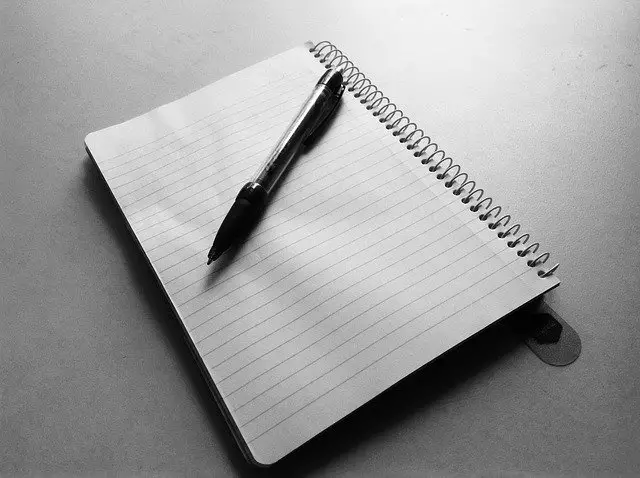
First, you need to know if your teacher wants you to write the essay in a narrative format or in a question answer format. This will affect how you organize your paper. Both essay formats need a strong introduction, an organized body and a solid conclusion. The difference is that the question and answer essay will use direct quotes with your questions. The narrative essay can have paraphrased information from the interview mixed in with direct quotes.
Writing the Informational Interview Essay
Hopefully, you took copious (many) notes during your interview and hopefully you were allowed to record the interview to catch any information that you missed in your notes. Now, you need to organize your information into a logical outline Probably the easiest way to organize all the information is to read through your notes and to listen to the recording of the interview. You need to think about what the reader would like to know about the person you interviewed. Pick three main themes or ideas that you talked about during the interview. These will become body paragraphs for your essay. Once you have wrapped your brain around the three main things you are going to talk about in your essay, you need to write out an outline.
Sample Outline
This outline will help you write a five paragraph essay for a narrative format. However, you can easily organize your question and answer format essay using this outline as well. I. Introduction Start with a humorous or interesting anecdote or fact that the person told you. Thesis statement: A thesis statement is one sentence that tells who was interviewed, his or her title, and why you interviewed the person. Basically, what do you plan to tell your reader about this person? This must be in the introduction, and you must spell the person’s name correctly. Read this article on how to write a thesis statement for more help. II. Body paragraph 1: One big idea you learned III. Body paragraph 2: Second big idea you learned IV. Body paragraph 3: Third big idea you learned V. Conclusion: You need to wrap up your essay by summarizing and writing some concluding remarks about the person.
Write the Interview Essay
Depending on the assigned length of your paper, you can write a paragraph for each Roman numeral on your outline. However, if you need to write a longer essay, you can have several paragraphs for Roman numerals II, III, and IV. You need to make sure that you put quotation marks around words that the person said, and you need to make sure that you body paragraphs support your thesis statement. Once you have a rough draft written, you need someone to peer-edit your paper. Then, you can write a final copy for your teacher. You should now be an expert on how to write an interview essay. You may need to edit and revise your essay to get a top grade, but you should understand the writing process for the interview essay.
This post is part of the series: Interviews and Essays
The following articles will help you to complete an interview and write the interview essay.
- How to Interview Someone for a Paper
- How to Write an Interview Essay
- How to Write an Interview Essay: Short Guide with 5 Examples
How to Write an Interview Essay in Only 4 Steps
“Questions are never indiscreet. Answers sometimes are.” Oscar Wilde
The quote is taken from the interview given by a famous Irish writer, the author of magnificent plays, poems, and essays. It can be a good start for your interview essay on Oscar Wilde or a living person. Teachers assign interview essays rarer than research papers, book reports, critical articles, case studies, and other writing assignments. It is a great way to learn how to make questions and ask them properly. Please consider this information, which includes some interview essay examples plus the detailed instructions on how to make a paper of such type.
Writing is a difficult job. If you search for the way to avoid time-consuming research, developing outlines, writing & formatting an essay, feel free to contact professional academic writers .
What Is an Interview Essay?
Before writing an outline, take your time to define an interview essay. It is a paper written to give an idea of how the face-to-face conversation with specific person looked like, what sort of impressions it left, and how useful the speech can be. This form of work represents what an interviewed person thinks about a particular topic. If you are asked to support your research paper with a powerful interview essay, it means you should ask the field’s expert important questions on the chosen topic.
Example: Ask a professor from the college of your dream more about how popular UK universities get their great rankings.
The process allows getting a deeper inside on the topic through the shared experience, personal examples, and important lessons learned by the interviewed person. An interviewee should write a summary of the conversation on a separate paper once the meeting is over. That would be the required work. Those who wish to become journalists or good authors one day must know how to conduct interviews and other types of surveys.
Take free interview essay examples here to learn more!
Short Guide on How to Write an Interview Essay
Learn how to write an interview essay of any form using the information below.
- Define the goal of your work. Are you interested in the process of cooking fish in the famous restaurants, upcoming presidential elections, the way they shoot movies in Hollywood, or answers to your homework questions? Decide on the purpose first to determine the interview’s type (look at the interview essay examples below).
- Start with the research . No academic or scientific writing is available without a good research meaning the writer should search for the most relevant, recently discussed topic related to his subject. Research different media channels to pick the best questions. Pay attention to what professional journalists tend to ask working on the same topic.
- Depending on the things you want to discuss, pick the person to answer your questions. In case you wish to ask questions on the narrow subject, a single person would be enough; in other situations, you’d better dedicate time to forming a list of people specializing in the area of your interest.
- Get ready with your questions for the essay writing for the interview. Make a list of several great questions most famous writers tend to ask people working in the field of your interest. Add some additional questions: you might have an extra time. Rank your questions from the least important to the most in order not to miss the point. One of the most important parts is to pick the opening question to ask; it should be a good question, which will help your interviewed person understand your intentions are serious, and you are worth spending his/her time. It is like writing a hook sentence to start your paper originally.
Interview Essay Examples
Several different types of essay writing for interview exist. It is important to define the form of your work before starting; based on your goals and things you wish to cover, pick one of the listed forms.
The Sequential Interview
The first example of the essay writing for interview is a sequential form. It means several people are asking different questions on the related topic. The interviewees ask different questions to examine different sets of competencies within the given field of study. Make sure you have different questions from your supporting writer. Spend some time on matching your results by comparing answers, pick the most interesting questions, write an outline, and get ready with your final paper!
If your co-authors are famous writers or journalists, do not forget to cite their quotes correctly!
Career Interview Essay
Inc.Com shares each corporate job opening obtains 250 resumes on the average. The source adds three things matter to Millenials in the organizations they work: growth opportunities, retirement benefits, and work culture.
To help a person get the job of his/her dream, you should focus on these three things in the career interview essay. Many people wish to work in good companies, but they do not possess enough time and skills to work on the outstanding application form. There is nothing extraordinary about a regular CV/resume that can attract the attention of the busy employer. Different job applicants ask professional writers for help. They can either ask a good writer like you to prepare a powerful career interview essay format or hire professional online writers to make a great resume.
Narrative Interview Essay
Three things make an interview essay a narrative form of writing:
- Description
- Explanation
If you want to make a great story out of the conversation with an interesting person or group of people, turn your interview into the short story with its unique plot, characters, and lessons.
Leadership Essay
How to write an interview essay on leadership? Leadership is one of the most interesting & exciting things to write about, and many people can be interviewed as the inspiring leaders:
- Political authorities
- Historical figures
- CEOs of successful companies
Pick one of these professionals to ask questions on the specific topic to get several good examples and fresh ideas for your writing.
Personal Interview
An interview essay format is different from the regular personal interview. It should not look like a dialogue between two people; pick the most shocking/unexpected/awesome answers from the list. Write your personal interview essay based on these answers. Develop a thesis statement to specify why this person was interesting to ask your questions; conduct a research to include supporting details in the paper’s body; make a powerful conclusion to leave a strong impression on your reader.
You can conduct research to find & observe more examples of essays. Try to remember this information to write a good story. If you don’t want to waste your time on numerous writing assignments, the best thing you can do is to ask professional online writing service for help. To do so, leave your order . Fill in the order form describing the subject, difficulty, paper’s format, volume, and time required to finish the work. Viewing great interview essay examples online is also helpful!
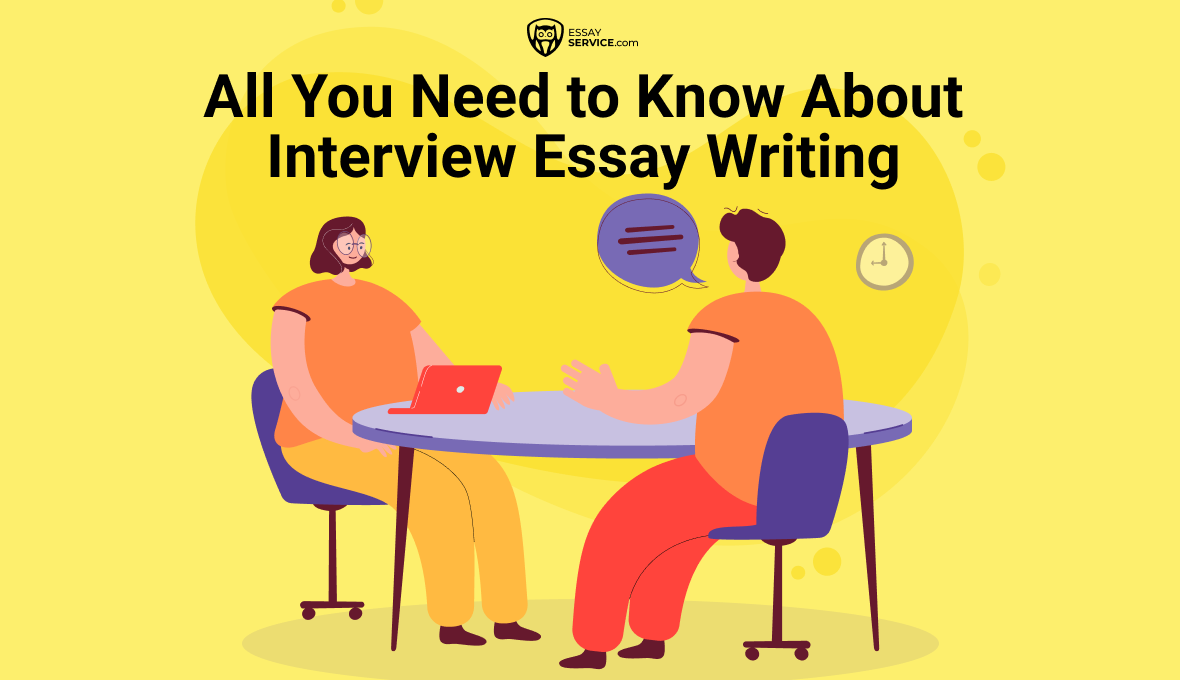
All You Need to Know About Interview Essay Writing

Purpose of Writing an Interview Essay
The writing process is not always smooth sailing. When it comes to the construction of interview papers, you are free to ask about myriads of issues of your interests and get a broad insight from the interview subject. Once you figure out the main thesis statement for your interview essay, you must collect relatable data in question-and-answer format. The gathered information is almost always subjective since the authoritative individuals and qualified experts are your main data providers. Interview essays are constructed based on people's biased opinions rather than books, historical records, and other sources.
Are you looking for answers on how to write an outline for interview essay? We are here to provide you with useful tips on how to write interview APA format essay.
You might as well find this article helpful since we have prepared essay writing in interview sample at the end of it.
Format for Writing an Interview Essay
Are you on the verge of choosing an appropriate format to write an interview essay? One of the essential steps includes identifying the type of interview paper you are willing to write. The interview essay format is determined based on the style of your paper. There are three basic types of interview papers:

- Narrative Essay Interview - Through this type of paper, you are assigned to research a specific topic based on the conducted interview. The main thing is to accumulate all the information that the interviewed person has provided in a neat and organized manner in the form of a narrative. The story might be written from your perspective or that of the interviewee. In that case, you are free to write in the first and second person.
- Personal Interview - Such type of paper demands you to prepare a list of witty interview questions to ask a specific person who holds a certain type of authority based on their professional occupation. The final product turns out to be an interview in essay format.
- Question-answer Interview - Such interview questions are often asked to job seekers. This is your chance to glance through the common interview questions that the hiring managers will ask you to get a glimpse of your personality and career goals. The questions and answers can be combined in an interview paper. For more information, check out internship interview questions and answers here.

How to Write an Outline for Interview Essay
After you have chosen key points for your interview paper and adjusted its format accordingly, you might wonder, 'should I write an outline for an interview essay ?'. The answer is clear and direct - 'Yes, definitely!'
Good writers always prepare an outline in advance, which is a great tip to lift the burden of the time-consuming paper writing process. The basic structure of interview essay outline includes three major parts:

- Introduction - As you state your paper's thesis statement, you can start writing by introducing the person or the people you interviewed.
- Body Paragraphs - The following paragraphs should contain the subjective points of view that your interviewees provided concerning your major thesis statement.
- Conclusion - In the concluding paragraph of the essay, restate the paper's main goal and summarize the most important points you have made so far.
Writing an Interview Essay Introduction
Once you wrap up the interview essay, outline you are ready to start the writing process. Writing a catchy lead and grabbing a reader's attention right away is not a simple task. However, there are some key elements that make up the best of the introduction part of your interview essay. The primary sentence should briefly contain the main objective behind the chosen topic of the paper. The following sentences should report the importance of your essay topic to your target audience. Finally, you can proceed with the thesis statement, which indicates the basic value of your paper. In other words, try to answer the question of what benefits the reader gets from familiarizing themself with your interview paper.
Do not hesitate to ask us to write an essay for me whether you are assigned to construct an interview essay on writing or any other given subject.
Writing an Interview Essay Body Paragraphs
The body paragraphs hold the majority of the essay. Provided paragraphs support the central statement with relatable facts, details, and key points as the answers that an interviewer asks.
Some of the interviewers prefer to use a recording device, while others opt for notes to contain the important data in its entirety. They choose to include parts of the narrative later in the body paragraphs of the essay as they gather the most important and thematic points made throughout the interview process. You might as well include direct quotes or in-text citations as the sources of provided answers. However, always keep in mind to ask for written permission if you plan to paraphrase or directly copy their ideas word by word according to the issue of your interest.
Writing an interview essay can be hard, so if you are looking for further tips on how to write an essay , we can provide you with an interview essay outline example as well as the complete paper itself.
Writing an Interview Essay Conclusion
The classic format for writing an interview essay includes jotting down the main objectives made throughout the paper in a final paragraph, otherwise known as the conclusion. The last paragraph is not any less important compared to the opening one. That is why you should try and restate the crucial points that interviewees have made while answering questions provided by you. That way, you will sound even more persuasive as you provide evident arguments supported by powerful public figures regarded as influential in society.
You are welcome to conclude the essay with a respectful thank you note as well. Express sincere gratification to the reader for taking the time to read your essay and focus on your contribution to them with the source of information contained in the written interview paper.
If you don’t have distinguished skills for writing an outline for college interview essay, our experts have your back! Contact us to write papers for money and enjoy a perfectly-crafted assignment.
Essay Writing Topics in Interview
Looking for inspiration? Researching an interesting topic for the essay can be exhausting sometimes. But we are here to give you a helping hand through tough times. Our experts have gathered some of the most compelling essay writing topics in interview. You are free to take a look at them and choose one that satisfies your curiosity and challenges you to be analyzed in depth.
- Does body language describe our mental state?
- How important is eye contact for establishing genuine connections?
- Are educated and qualified people obliged to give more to others?
- Which job position is the most attractive in the 21st century?
- Do career services help people get to their target job market?
- Does conflict resolution hold an important place in the contemporary world?
- What is love, and where do you feel it or experience it most often?
- How do our family heritage and traditions influence our personalities?
- How many hours of sleep are needed at different stages of life?
- What kind of skills is essential to possess in order to become a good leader?
- Should the tax system be allocated to the rich and poor accordingly?
- Is the two-party system the guarantee of American democracy in the US?
- Should combatting racism be an individual responsibility?
- Should the American people restrict the amount of money spent on the electoral college?
- How do relationships and friendships shape our lives?
- Do your dreams and nightmares reflect real-life events?
- How do you keep yourself from getting sick?
- Does technology make your daily life easier?
- Do you agree or disagree with the idea that opposites attract?
- What does it mean to be a religious and faithful person to you?
We hope those mentioned above, as well as other essay writing topics for interview in google, will fuel your curiosity.
Meanwhile, you can always pay for papers . Our experts are capable of writing an essay for a job interview based on your individual demands that will get you closer to your dream position.
Interview Essay Writing Examples
Here is one of the interview essay writing examples to check out. We hope that the provided example will give you some kind of perspective:
'A LEADER IS ONE WHO KNOWS THE WAY, GOES THE WAY, AND SHOWS THE WAY'
According to the popular idea, leaders are born rather than made. Contrary to this belief, many real-life examples prove that people can grow into a leader type as they grow older if they want to. Any man can be a leader, but it is not an easy thing to do. You need to know yourself to set an example for others, inspire them, and give them a sense of trust to follow your steps. People are inclined toward those who know where they are going, have their own vision, and are educated enough to support their decisions with rational arguments. These traits give leaders the power to be persuasive. They have their goals set and are not afraid to firmly face any challenges that life might throw their way.
To support this statement, we have interviewed a Pakistani female education activist, Malala Yousafzai, who also carries the honor of being the 2014 Nobel Peace Prize laureate. She is a pure example of how one can rise from any kind of social and domestic circumstances if one has a vision and works hard enough to achieve their goals. She realized the value of education from a very young age. The latter was often inaccessible for girls of her nation due to authoritative powers in the head of the government, under which education was banned for almost all the females in the Northern Pakistani region. Malala persistently fought for her truth and raised awareness about the value that educating girls and boys could hold. She began writing articles and her personal insights anonymously to describe the intolerable circumstances that females had to face under the group of dictators, highlighting the purpose of education and its unavailability for girls of Pakistan.
Malala's example is one of a kind. She wants to be remembered as a girl who tries to help others in whatever capacity she can hold. She did everything possible to let the outer world know about the injustice that the government of her nation committed. She never backed down even after the confrontation between her and the representatives of the ruling power at the head of the Pakistani government.
Further Academic Help
We hope you gained some beneficial information throughout this article which will help you craft a top-notch interview essay for your journalism class. In case of further assistance, our expert writers are here to provide you with interview essay examples APA format at our paper service platform.
Before you go, you are welcome to take an essay writing test for interview to check how well you understood the concept of the article and implement gained knowledge into your upcoming assignment.
Frequently asked questions
She was flawless! first time using a website like this, I've ordered article review and i totally adored it! grammar punctuation, content - everything was on point
This writer is my go to, because whenever I need someone who I can trust my task to - I hire Joy. She wrote almost every paper for me for the last 2 years
Term paper done up to a highest standard, no revisions, perfect communication. 10s across the board!!!!!!!
I send him instructions and that's it. my paper was done 10 hours later, no stupid questions, he nailed it.
Sometimes I wonder if Michael is secretly a professor because he literally knows everything. HE DID SO WELL THAT MY PROF SHOWED MY PAPER AS AN EXAMPLE. unbelievable, many thanks
You Might Also Like
.png)
New Posts to Your Inbox!
Stay in touch
Student Interview Essay Example (Tips for a Successful Interview)

A student interview essay is a type of academic assignment where students are required to conduct an interview with someone and then write an essay based on the insights gained from the interview. This type of essay allows students to delve into a particular topic or subject by gathering firsthand information from someone with expertise or experience in that area.
Student interview essays can be a valuable tool for learning, as they provide an opportunity for students to engage with real-life experiences and perspectives. By conducting an interview and writing an essay, students can develop critical thinking skills, improve their writing abilities, and gain a deeper understanding of the subject matter.
How to Conduct a Successful Interview
Conducting a successful interview is crucial for obtaining the information needed to write a compelling essay. Here are some tips to help you conduct a successful interview:
- Do your research: Before conducting the interview, research the topic or subject matter extensively. This will help you ask informed and relevant questions.
- Prepare a list of questions: Create a list of questions that will guide the interview and cover all the important aspects of the topic. Make sure to include open-ended questions that encourage the interviewee to provide detailed responses.
- Choose an appropriate setting: Select a quiet and comfortable location for the interview to ensure that both you and the interviewee can focus and communicate effectively.
- Be professional and respectful: Treat the interviewee with respect and professionalism. Maintain proper etiquette throughout the interview and actively listen to their responses.
- Take accurate notes: Take detailed notes during the interview to capture the interviewee’s responses accurately. This will help you when writing the essay later.
The Structure of a Student Interview Essay
A student interview essay typically follows a similar structure to other types of essays. It should include an introduction, body paragraphs, and a conclusion. Here is a breakdown of each section:
1. Introduction
The introduction should provide background information about the interviewee and the topic being discussed. It should also include a thesis statement that presents the main argument or purpose of the essay.
2. Body Paragraphs
The body paragraphs should present the information gathered from the interview in a logical and organized manner. Each paragraph should focus on a specific point or topic related to the interview.
- Example: Provide a specific example or anecdote from the interview that supports the main argument or point being discussed.
- Analysis: Analyze the information provided by the interviewee and discuss its significance or relevance to the topic.
- Supporting evidence: Use additional research or examples to support the points made in the interview.
3. Conclusion
The conclusion should summarize the main points discussed in the essay and restate the thesis statement in a concise manner. It should also provide a closing thought or reflection on the insights gained from the interview.
Common Mistakes to Avoid in a Student Interview Essay
When writing a student interview essay, there are some common mistakes that you should avoid to ensure the quality and effectiveness of your essay:
- Lack of preparation: Failing to adequately prepare for the interview can result in a lack of focus and relevant questions.
- Biased or leading questions: Avoid asking questions that steer the interviewee towards a specific answer or express your own biases.
- Failure to actively listen: Actively listen to the interviewee’s responses and engage in the conversation. This will help you gather more meaningful information.
- Inaccurate or incomplete notes: Take accurate and detailed notes during the interview to ensure the information is properly represented in your essay.
Top Interview Tips for Students
Preparing for an interview can be nerve-wracking, especially for students who are new to the process. Here are some top interview tips to help you succeed:
- Research the company or organization: Familiarize yourself with the company’s mission, values, and recent news. This will demonstrate your interest and preparation during the interview.
- Practice common interview questions: Prepare answers to common interview questions such as “Tell me about yourself” or “Why are you interested in this position?” Practicing your responses will help you feel more confident during the actual interview.
- Dress appropriately: Dress professionally and appropriately for the interview. This will show that you take the opportunity seriously and respect the interviewer’s time.
- Arrive early: Aim to arrive at least 10-15 minutes early for the interview. This will give you time to compose yourself and gather your thoughts before the interview starts.
- Ask insightful questions: Prepare a list of thoughtful questions to ask the interviewer. This demonstrates your interest in the position and your desire to learn more about the company or organization.
- Follow up with a thank-you note: After the interview, send a thank-you note or email to the interviewer to express your gratitude for the opportunity. This small gesture can leave a positive impression.
A student interview essay can be a valuable learning experience that allows you to gather firsthand information and develop critical thinking skills. By following the tips and guidelines provided in this article, you can conduct a successful interview and write an engaging essay that showcases your understanding of the subject matter. Remember to be well-prepared, professional, and respectful during the interview process, and avoid common mistakes that can diminish the quality of your essay. Good luck with your student interview essay!
Related Posts:
- Aritzia Interview Questions: How to Prepare and Succeed When it comes to preparing for a job interview, it's important to do your research and anticipate the questions that may come your way. This…
- Peloton Interview Questions: Tips and Advice for Success Are you preparing for an interview with Peloton, the popular fitness company known for its innovative exercise equipment and virtual workout classes? Landing a job…
- DevSecOps Interview Questions: Tips and Common Questions for Success Preparing for a DevSecOps interview can be a challenging task, as this field requires a unique combination of skills and knowledge. DevSecOps, which stands for…
- Mastering the Art of Rubric Interview Questions: A Comprehensive Guide Interviews are an essential part of the hiring process, allowing employers to gauge a candidate's suitability for a role. However, traditional interview questions often fail…
- Treasury Interview Questions: What You Need to Know to Ace Your Interview Preparing for a treasury interview can be both exciting and nerve-wracking. To help you feel more confident and prepared, we have compiled a list of…
Leave a Comment Cancel reply
Save my name, email, and website in this browser for the next time I comment.
Using an interview in a research paper
Consultant contributor: Viviane Ugalde
Using an interview can be an effective primary source for some papers and research projects. Finding an expert in the field or some other person who has knowledge of your topic can allow for you to gather unique information not available elsewhere.
There are four steps to using an interview as a source for your research.
- Know where and how to start.
- Know how to write a good question.
- Know how to conduct an interview.
- Know how to incorporate the interview into your document or project.
Step one: Where to start
First, you should determine your goals and ask yourself these questions:
- Who are the local experts on topic?
- How can I contact these people?
- Does anyone know them to help me setup the interviews?
- Are their phone numbers in the phone book or can I find them on the Internet?
Once you answer these questions and pick your interviewee, get their basic information such as their name, title, and other general details. If you reach out and your interview does not participate, don’t be discouraged. Keep looking for other interview contacts.
Step two: How to write a good question
When you have confirmed an interview, it is not time to come up with questions.
- Learning as much as you can about the person before the interview can help you create questions specific to your interview subject.
- Doing research about your interviewee’s past experience in your topic, or any texts that they have written would be great background research.
When you start to think of questions, write down more questions than you think you’ll need, and prioritize them as you go. Any good questions will answer the 5W and H questions. Asking Who, What, When, Where, Why, and How questions that you need answered for your paper, will help you form a question to ask your interviewee.
When writing a good question, try thinking of something that will help your argument.
- Is your interviewee an advocate for you position?
- Are they in any programs that are related to your research?
- How much experience do they have?
From broad questions like these, you can begin to narrow down to more specific and open-ended questions.
Step three: The interview
If at all possible, arrange to conduct the interview at the subject’s workplace. It will make them more comfortable, and you can write about their surroundings.
- Begin the interview with some small talk in order to give both of you the chance to get comfortable with one another
- Develop rapport that will make the interview easier for both of you.
- Ask open-ended questions
- Keep the conversation moving
- Stay on topic
- The more silence in the room, the more honest the answer.
- If an interesting subject comes up that is related to your research, ask a follow-up or an additional question about it.
- Ask if you can stay in contact with your interview subject in case there are any additional questions you have.
Step four: Incorporating the interview
When picking the material out of your interview, remember that people rarely speak perfectly. There will be many slang words and pauses that you can take out, as long as it does not change the meaning of the material you are using.
As you introduce your interview in the paper, start with a transition such as “according to” or other attributions. You should also be specific to the type of interview you are working with. This way, you will build a stronger ethos in your paper .
The body of your essay should clearly set up the quote or paraphrase you use from the interview responses,. Be careful not to stick a quote from the interview into the body of your essay because it sounds good. When deciding what to quote in your paper, think about what dialogue from the interview would add the most color to your interview. Quotes that illustrate what your interviewer sounded like, or what their personality is are always the best quotes to choose from.
Once you have done that, proofread your essay. Make sure the quotes you used don’t make up the majority of your paper. The interview quotes are supposed to support your argument; you are not supposed to support the interview.
For example, let’s say that you are arguing that free education is better than not. For your argument, you interview a local politician who is on your side of the argument. Rather than using a large quote that explains the stance of both sides, and why the politician chose this side, your quote is there to support the information you’ve already given. Whatever the politician says should prove what you argue, and not give new information.
Step five: Examples of citing your interviews
Smith, Jane. Personal interview. 19 May 2018.
(E. Robbins, personal communication, January 4, 2018).
Smith also claimed that many of her students had difficulties with APA style (personal communication, November 3, 2018).
Reference list
Daly, C. & Leighton W. (2017). Interviewing a Source: Tips. Journalists Resource.
Driscoll, D. (2018 ). Interviewing. Purdue University
Hayden, K. (2012). How to Conduct an Interview to Write a Paper . Bright Hub Education, Bright Hub Inc.
Hose, C. (2017). How to Incorporate Interviews into Essays. Leaf Group Education.
Magnesi, J. (2017). How to Interview Someone for an Article or Research Paper. Career Trend, Leaf group Media.
Ultimate Guide to Writing Your College Essay
Tips for writing an effective college essay.
College admissions essays are an important part of your college application and gives you the chance to show colleges and universities your character and experiences. This guide will give you tips to write an effective college essay.
Want free help with your college essay?
UPchieve connects you with knowledgeable and friendly college advisors—online, 24/7, and completely free. Get 1:1 help brainstorming topics, outlining your essay, revising a draft, or editing grammar.
Writing a strong college admissions essay
Learn about the elements of a solid admissions essay.
Avoiding common admissions essay mistakes
Learn some of the most common mistakes made on college essays
Brainstorming tips for your college essay
Stuck on what to write your college essay about? Here are some exercises to help you get started.
How formal should the tone of your college essay be?
Learn how formal your college essay should be and get tips on how to bring out your natural voice.
Taking your college essay to the next level
Hear an admissions expert discuss the appropriate level of depth necessary in your college essay.
Student Stories
Student Story: Admissions essay about a formative experience
Get the perspective of a current college student on how he approached the admissions essay.
Student Story: Admissions essay about personal identity
Get the perspective of a current college student on how she approached the admissions essay.
Student Story: Admissions essay about community impact
Student story: admissions essay about a past mistake, how to write a college application essay, tips for writing an effective application essay, sample college essay 1 with feedback, sample college essay 2 with feedback.
This content is licensed by Khan Academy and is available for free at www.khanacademy.org.
- Share full article
Advertisement
Supported by
Student ‘How To’ Contest Winner
How to Conduct a Podcast Interview
A winning essay by Matthew Jeong, age 17.

By The Learning Network
This essay, by Matthew Jeong, 17, from Houston, is one of the Top 11 winners of The Learning Network’s new “How To” Informational Writing Contest for Teenagers .
We are publishing the work of all the winners over the next several days, and you can find them here as they post.
“You’ve got to do the homework,” says Brian Sebastian, podcast host of Movie Reviews and More, which has garnered millions of views on IHeartRadio, Comcast and Apple TV. Conducting an interview for a podcast isn’t just your standard Q&A or casual chat. It requires preparation and practice. “It seems obvious, but you’d be surprised how many people don’t do that. It’s not a recommendation, it’s a requirement.”
The interview should never be your first exposure to the subject. Your job is to broadcast your interviewee’s story, so it’s necessary to know enough about the subject to hold an informed conversation. Have a list of questions loosely based on the subjects you want to cover. This means making yourself familiar with their work. “If it’s a producer, well, you have to watch the movie. For an author, read their book. You have to stay as knowledgeable as possible, because if you haven’t seen it or read it, your audience will know,” Sebastian says.
An interview isn’t just about research; it’s a story tailored to the speaker. Your role is to pull it out of your guest one question at a time. Prepare more questions than you’ll need just in case, but be prepared to skip over them during the interview. Match the intensity and personality of your guests. “For me, it’s about the energy given and taken, cause and effect,” Sebastian says. A loud, boisterous speaker may need something a bit more calm, while someone quiet and reserved may need more spirit to pull them out of their shell.
On the other hand, over preparation can cause your interview to feel artificial and the conversations too stilted. “Be fluid, be adaptable. Most of all, ask about what you’re really interested in,” Sebastian says, warning against memorizing a script. Don’t be afraid to improvise during the interview. Keep the conversation flowing through unique and genuine questions. An interview should feel not only in depth, but interactive. “It’s like a book, really — only you get to choose what content the pages will cover.”

Search form
Make a Gift
Department of Economics
- Undergraduate
How to Write a Thank You Email After an Interview
Article written by Christopher Littlefield for Harvard Business Review
You’ve just finished an interview for a job opportunity you’re really excited about. You know you should send a thank you note to your interviewers, but you’re not sure what to write. How much detail should you include? Should you send an email to every person you interviewed with? And what’s really the best way to follow up ?
Here’s some advice on what to say — and not to say — in your message, along with sample email templates. I’ll also cover why writing a thank you note is something you should do, even if it feels like a formality. Let’s start with what to write in your note.
How to Write a Thank You Email
Your email should be short, sincere, and sent within 24 hours of your interview.
1. Address the email to the person who interviewed you and make sure you spell their name correctly. If their name is Christopher and they asked you to call them Chris in the interview, address them as such in your follow-up. If you interviewed with multiple people, it’s a good practice to send each person a brief message as well.
2. Thank the person for their time and consideration.
3. Briefly highlight your draw to the organization. David Lancefield, a former partner at PwC and now CEO coach, suggests that candidates “call out an aspect of the conversation that was particularly interesting or share a helpful hook to help them remember what you spoke about.”
4. Express your continued interest in the job opportunity.
5. Offer to answer any questions.
Lourdes Olvera-Marshall, who teaches networking and career management courses at NYU, recommends jotting down quick notes when you’re interviewing. Write down your interviewer’s name, what you discuss, and a few key words to trigger your memory, so you can make your follow-up message more meaningful. As she told me, “The thank you note starts during the interview.”
What to Avoid in Your Thank You Email
If you don’t want to leave the interviewers with a bad impression, avoid these three common mistakes.
Adding too much detail
Remember that the intention of the message is to say thank you, not to pick up where your interview left off. “Your follow-up is not the place to add all the things you wish you had highlighted in your interview,” Olvera-Marshall warns. When you do, you run the risk of appearing desperate or like you weren’t prepared for the interview.
Making requests
People are busy. Avoid requesting anything that creates additional work. You want to show your interviewer that you’re easy to work with.
And of course, don’t forget to review your email for grammar and spelling before sending. This is an example of your communication.
Sample Thank You Email Templates
Use the samples below to get started, but make sure you customize them to fit your needs.
Subject: Thank you
It was great speaking with you yesterday about being a possible fit for your team. I appreciate the transparency into the project you are working on and what it is like working at [company name]. It seems like an amazing team and an exciting project with huge potential. I am excited about the possibility of working with you. If you have any questions or want to continue our conversation, please reach out at any time.
I look forward to being in touch.
All the best,
Thank you for taking the time to meet with me today and sharing some of the innovative work you and your team are doing to support your clients.
From our conversation, I understand that the pace is fast, the work is top-notch, and as hard as you work, you all have a great time doing it together. People’s passion for their work was tangible and the sense of community was amazing.
I also understand you are looking for a person who can hit the ground running, does not need hand-holding, and is fun to work with. I am confident I am that person.
If you have any questions or want to continue our conversation, please feel free to reach out at any time.
Dear Mr. Cassidy,
I want to thank you for taking the time to meet with me today to discuss the financial planner position at Cascade Associates. I appreciate you sharing the history behind your family business and that you care for every customer as if they were your own family.
From our conversation, I understand that maintaining the legacy of top-notch service is your priority, and you are looking for planners who want to continue that legacy for years to come. As I shared, I have a young family of my own, and I am looking to put down roots with an organization that I can be proud to work for. I am excited about the possibility of joining your team.
Why Is It Important to Send a Thank You Note?
Beyond it being a nice gesture, there are multiple benefits to sending a follow-up message after an interview.
It creates a positive connection with the interviewer(s).
No matter how well your interview went, many hiring managers squeeze multiple interviews into their busy schedules. A thoughtful message helps you leave a lasting positive impression after the interview is over.
It helps you stand out from the crowd.
Investing the time to send a thank you increases your chances of standing out from other applicants. One study found that only one out of four candidates sent thank you messages after their interviews, yet 80% of HR managers said those messages were helpful when reviewing candidates.
It’s an opportunity to demonstrate your professionalism and people skills.
It’s one thing to tell an interviewer you’re detail-oriented and work well with others — it’s another to show them. A well-crafted and timed thank you message illustrates your follow-up, your ability to capture the meeting’s essence in writing, and that you understand the importance of expressing your appreciation for others.
It confirms your interest in the job.
Hiring managers understand that candidates may be interviewing for multiple jobs at the same time. Busy themselves, leaders don’t want to invest time in a candidate who is not invested in the role they’re hiring for. A thank you message confirms that you’re both interested and excited about the role and worth following with.
You may send your message and get a response in minutes, or you may never hear back at all. Either way, investing 15 minutes to express your appreciation may be the difference between getting the job or getting lost in the crowd.
How Mercer’s CEO planned her own retirement–and succession

Martine Ferland has spent more than 40 years on the front lines of retirement. This week, the CEO of Mercer and vice chair of Marsh McLennan is stepping down to start her own. Over the past five years, she has led the consulting giant to its best growth since 2008. In recent months, she’s also focused on facilitating a smooth transition for her successor, Pat Tomlinson. That includes traveling with him on a grand tour of Mercer’s global locations, holding weekly two-hour meetings on a wide range of topics, and letting Tomlinson own all the long-term decisions so they’re aligned with his vision.
She also gave him a book–a slim volume published last year by McKinsey called The Four Seasons of a CEO . Although it was not for sale (“a complete black market,” Ferland jokes), she did secure an extra copy that she presented to Tomlinson a few weeks ago at her retirement party in London. (This collection of articles might give you a taste of McKinsey’s leadership advice.)
Leaders like to impart wisdom through gifting books–or writing them. George David gave Louis Chenevert half a dozen history books to read when handing over the reins as CEO at United Technologies Corp. in 2008. (While writing a story on David, he sent me the same collection; Lenin’s Tomb stood out.) Ferland often gives books to colleagues, with a current favorite being The Heart of Business by former Best Buy CEO Hubert Joly in 2021.
Tomlinson says he plans to read Four Seasons . “I have it right here!” he said on a Zoom call, reaching above his desk. While the first chapter on becoming a high-potential CEO candidate didn’t captivate him, he says the second “would be good to read over the next few weeks as it’s about your first six to twelve months.”
More important was joining Ferland on global visits, especially as Tomlinson has built his career in the U.S. Along with helping him build key relationships, he says, Ferland shows “how you get good economic growth and outcomes and doing it with empathy.”
When asked which books have influenced him, Tomlinson reaches for two: The 2004 classic Blue Ocean Strategy and What Got You Here Won’t Get You There by executive coach Marshall Goldsmith in 2007. The latter came at a time in his career when he had to transition from building to influencing others as a leader. “Someone said, ‘Look, if you keep running things like this, you won’t have time for anything else.’ I gave that advice to somebody two days ago.”
Even for an HR consultancy, this CEO succession was unusually well-planned. “I wish I’d had an introduction similar to this one,” says Ferland, who recalls that her onboarding was rather short and sweet. Having helped her successor, her next best practice? Get out of the way.
Diane Brady [email protected]
Commuting is back–sort of
An analysis of travel patterns in 10 major global cities has shown that commuting has recovered since lockdowns brought in-office work to a sharp halt. But not as we knew it. In New York, for example, Amtrak’s passenger ridership has surpassed pre-pandemic levels. Yet employees are popping into the office for shorter periods, (or, “coffee badging” ) instead of commuting into the city for the whole working day. Financial Times
The rise and fall of Stability AI’s CEO
Emad Mostaque, the founder and CEO of Stability AI, resigned from the $1 billion startup he founded on Saturday, following a wave of key departures. Fortune ’s Jessica Mathews and Allie Garfinkle interviewed 20 Stability investors, former Stability and Coatue (one of Stability’s largest backers) employees, and Coatue-backed founders to uncover Mostaque’s stunning fall from grace. Fortune
Heat action plans
Hot off the heels of last year’s record-high temperatures, two of the world’s biggest aid agencies are set to host an inaugural global summit on extreme heat–and they’re urging business leaders, as well as governments, schools, and hospitals to prepare for the “silent killer” and develop “heat action plans.” In the U.S., extreme heat is already deadlier than all other climate impacts put together, including hurricanes and floods. Guardian
AROUND THE WATERCOOLER
It’s a ‘nepo’ housing market. More than a third of Gen Zers and millennials expect their parents to help with a down payment, survey finds by Alena Botros
Birkin bags can double in value in 5 years. An Hermès expert explains why it’s a better investment than gold by Jasmine Li
Exclusive: Many senior Amazon employees won’t get cash raises this year by Jason Del Rey
You’re more likely to make more money if you’re an older sibling—and now researchers think they know why by Irina Ivanova
Women outearn men in just a handful of U.S. cities, report finds—and not by a lot by Jane Thier
Diddy’s estimated $1 billion fortune is at risk after 5 lawsuits with explosive allegations. Here’s how the entertainment mogul made his money by Sydney Lake
Inside the cockpit at Boeing: Here are the top 5 candidates for CEO as Dave Calhoun exits (Commentary) by Jeffrey Sonnenfeld and Steven Tian
T his edition of CEO Daily was curated by Orianna Rosa Royle.
This is the web version of CEO Daily, a newsletter of must-read insights from Fortune CEO Alan Murray. Sign up to get it delivered free to your inbox.
Latest in Newsletters
- 0 minutes ago

Israel’s reported use of AI in its Gaza war may explain thousands of civilian deaths

Musicians are up in arms about generative AI. And Stability AI’s new music generator shows why they are right to be

The plight of a detained U.S. Binance staffer has deteriorated as Nigeria turns him into a political pawn

Banks often reject OnlyFans creators as customers. Then it happened to OnlyFans’ CEO

Here’s who challenges DEI efforts within companies, and how to get the workforce on board

Sixth Street invested $125 million with an all-star roster to launch Bay FC women’s soccer team—and the team just sold out its first home game
Most popular.

Singaporean firm whose ship took down the Baltimore bridge just cited an 1851 maritime law to cap liability at $44 million

California’s new $20-an-hour fast food minimum wage is so good that schools are worried they can’t compete for cafeteria workers

Hyundai and Kia recalled 3.4m vehicles, warning to park them outdoors because they risked catching fire. 6 months later, most are still on the road, unrepaired

‘A four-day workweek is coming,’ billionaire Mets owner Steve Cohen declares—and you can thank the rapid rise of AI

90% of homebuyers have historically opted to work with a real estate agent or broker. Here’s why that’s unlikely to change, according to the National Association of Realtors

Don’t brush right after you eat. Dentists say there’s one thing you should do after every meal that’s better for oral—and overall—health

IMAGES
VIDEO
COMMENTS
Like a triangle, begin at the top of the paragraph with a narrow-focused summary of the interviewee's main message. Then, continuing the triangle analogy, expand outwards and downwards from that point. Deliver the broader context for why the interview matters. To end the essay, quote how the interviewee said goodbye.
1. Think about your essay's purpose. The first step is to think about your essay's purpose. This consideration can help you determine what questions to ask during the interview, how to conduct it and how to write the resulting essay. For example, you may want to write an interview essay as an informative, factual piece for others to educate ...
Rank your questions in order of importance to make sure you ask your best ones, or list them all in the order you'd ask them and color-code the most important ones. 3. Arrange the interview (s). You'll need to contact the interviewee (or their representative) to arrange a time and place to conduct the interview.
Check what a narrative interview paper structure looks like when you reach out to several people: Introduction. Paragraph #1 - the first interviewee's perspective. Paragraph #2 - the second interviewee's opinion. Paragraph #3 - the third interviewee's thoughts. Conclusion.
Write your questions. Set up a time to meet with people (you will probably start with at least one in-class interview of another student). Ask questions and record the answers. Analyze the results. Write your essay. Start with the question, followed by a summary and analysis of the questions and answers.
How to Write an Interview Essay. Writing the interview essay involves several key steps, from choosing the right format to blending narrative and analysis. Your preparation and organization come together in this stage to create a compelling and informative piece. ... For example, if the interview was conducted in a significant location, mention ...
Center and bold the word "Abstract" at the top of the page. On the line below, without indenting, write a summary of your paper. In a single paragraph limited to 250 words, discuss the subject, the thesis, the purpose and necessity of the interview, the interviewees and the potential implications of your findings. 10.
Writing an interview paper requires careful selection of a topic, defining the purpose, finding a suitable interviewee and more. Here is a step-by-step guide to help you create a compelling interview essay: 1. Identify the purpose of the paper. The purpose of your paper will determine your subject, readers and the topics the essay will cover.
A standard interview essay from a custom writing service can range from 2,000 to 5,000 words or up to ten pages. Individual works are usually shorter. The interview essay format will have an introduction, body segments (perspectives grouped under different subheadings), and a summary. Here's an overview of what to put in each part.
Analyse the information / answers given by your interviewee. Once you have followed these stages, you can draft / outline your interview essay in a more standard format: Break up the responses into key themes or points that you will make. Identify any other sources that you will use in your essay. Give an approximate word count to each section.
Guidelines for an Interview Essay. When writing an interview essay, it would be best to create an outline first. Organize the information you have gathered from your interviewee and structure it in a logical order. This could be from one's personal information to the most compelling details gathered. Be reminded of the standard parts of an ...
Open your summary with who you interviewed and why. Your future audience will want to know the purpose of your summary, so start off strong by giving context to the interview. State the name of your interviewee, relevant background information, and the reason you interviewed them. [5]
First, you'll want to introduce the person or people you interviewed. This can be done by providing a brief overview of who they are and why you decided to interview them. Next, you'll want to include a thesis statement. This is a sentence or two that sums up the main point of your essay. It should be clear and concise, and it should give ...
Create an Outline. Develop an outline that outlines the structure of your essay. Start with an introduction that provides context and introduces the interviewee. Then, organize the main themes or topics into separate sections. Finally, conclude the essay by summarizing the key points and highlighting the interviewee's expertise.
This must be in the introduction, and you must spell the person's name correctly. Read this article on how to write a thesis statement for more help. II. Body paragraph 1: One big idea you learned III. Body paragraph 2: Second big idea you learned IV. Body paragraph 3: Third big idea you learned V. Conclusion: You need to wrap up your essay ...
The quote is taken from the interview given by a famous Irish writer, the author of magnificent plays, poems, and essays. It can be a good start for your interview essay on Oscar Wilde or a living person. Teachers assign interview essays rarer than research papers, book reports, critical articles, case studies, and other writing assignments.
Writing an Interview Essay Body Paragraphs. The body paragraphs hold the majority of the essay. Provided paragraphs support the central statement with relatable facts, details, and key points as the answers that an interviewer asks. Some of the interviewers prefer to use a recording device, while others opt for notes to contain the important ...
Student interview essays can be a valuable tool for learning, as they provide an opportunity for students to engage with real-life experiences and perspectives. By conducting an interview and writing an essay, students can develop critical thinking skills, improve their writing abilities, and gain a deeper understanding of the subject matter.
https://www.bestcustomwriting.com/blog/how-to-write-an-interview-essayThe interview is one of the most fundamental pillars of journalism. It is a tool that i...
Step three: The interview. If at all possible, arrange to conduct the interview at the subject's workplace. It will make them more comfortable, and you can write about their surroundings. Develop rapport that will make the interview easier for both of you. The more silence in the room, the more honest the answer.
• When you write up the interview, be sure that you quote accurately. • As a courtesy to your source, send a brief thank-you along with a copy of the document you write based on the interview. • Keep a record of the date and place of the interview as well as the name and title of your source.
May 21, 2023 by Prasanna. Interview Essay Example: An interview essay is a type of composing that transfers the data being assembled through an example Interview. It is done to make the perpetrators educated of the things examined during the screening. This kind of exposition permits the author to hand off their impacts on the example Interview ...
Sample College Essay 2 with Feedback. This content is licensed by Khan Academy and is available for free at www.khanacademy.org. College essays are an important part of your college application and give you the chance to show colleges and universities your personality. This guide will give you tips on how to write an effective college essay.
Follow these steps to create an interview report: 1. Combine interview preparation with writing preparation. Gather all the relevant information about the interviewee and the occasion for the interview. This preparation is the most important factor in planning a successful interview and interview report.
Match the intensity and personality of your guests. "For me, it's about the energy given and taken, cause and effect," Sebastian says. A loud, boisterous speaker may need something a bit ...
1. Address the email to the person who interviewed you and make sure you spell their name correctly. If their name is Christopher and they asked you to call them Chris in the interview, address them as such in your follow-up. If you interviewed with multiple people, it's a good practice to send each person a brief message as well.
1. Conduct Topic Research with AI. Research is a foundational part of writing high-quality content. When something is published, someone's reputation is at stake. Research makes sure that statements, claims, and opinions are backed up to a reasonable degree. Obviously, it's big for academic and business writing.
In an exclusive interview with our columnist, CTO Mira Murati explains the company's new Sora AI video tool and how it plans to roll it out.
Martine Ferland, CEO of Mercer, at her Manhattan office. Martine Ferland has spent more than 40 years on the front lines of retirement. This week, the CEO of Mercer and vice chair of Marsh ...